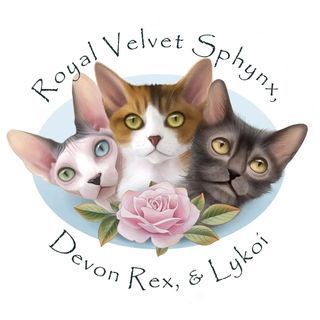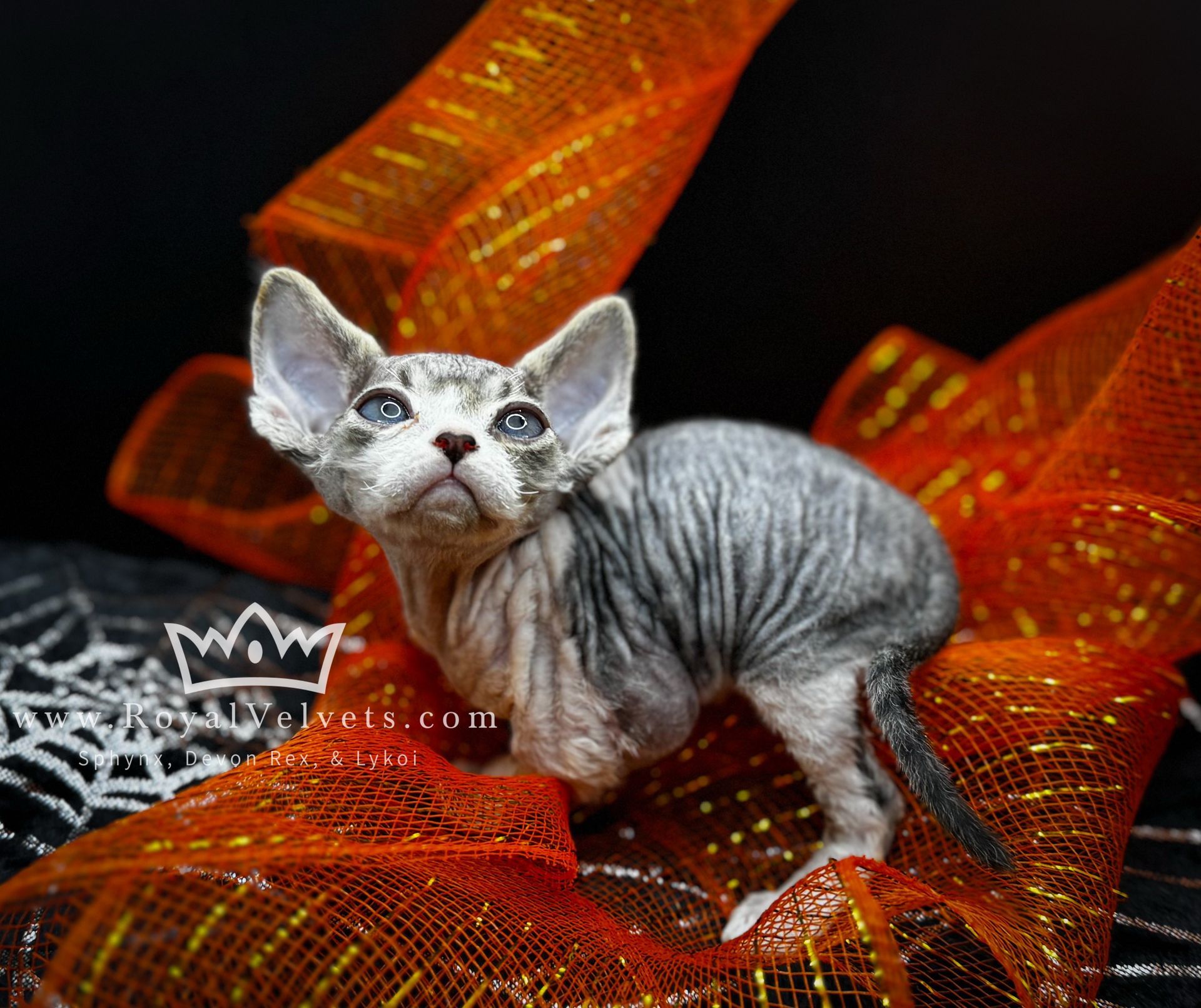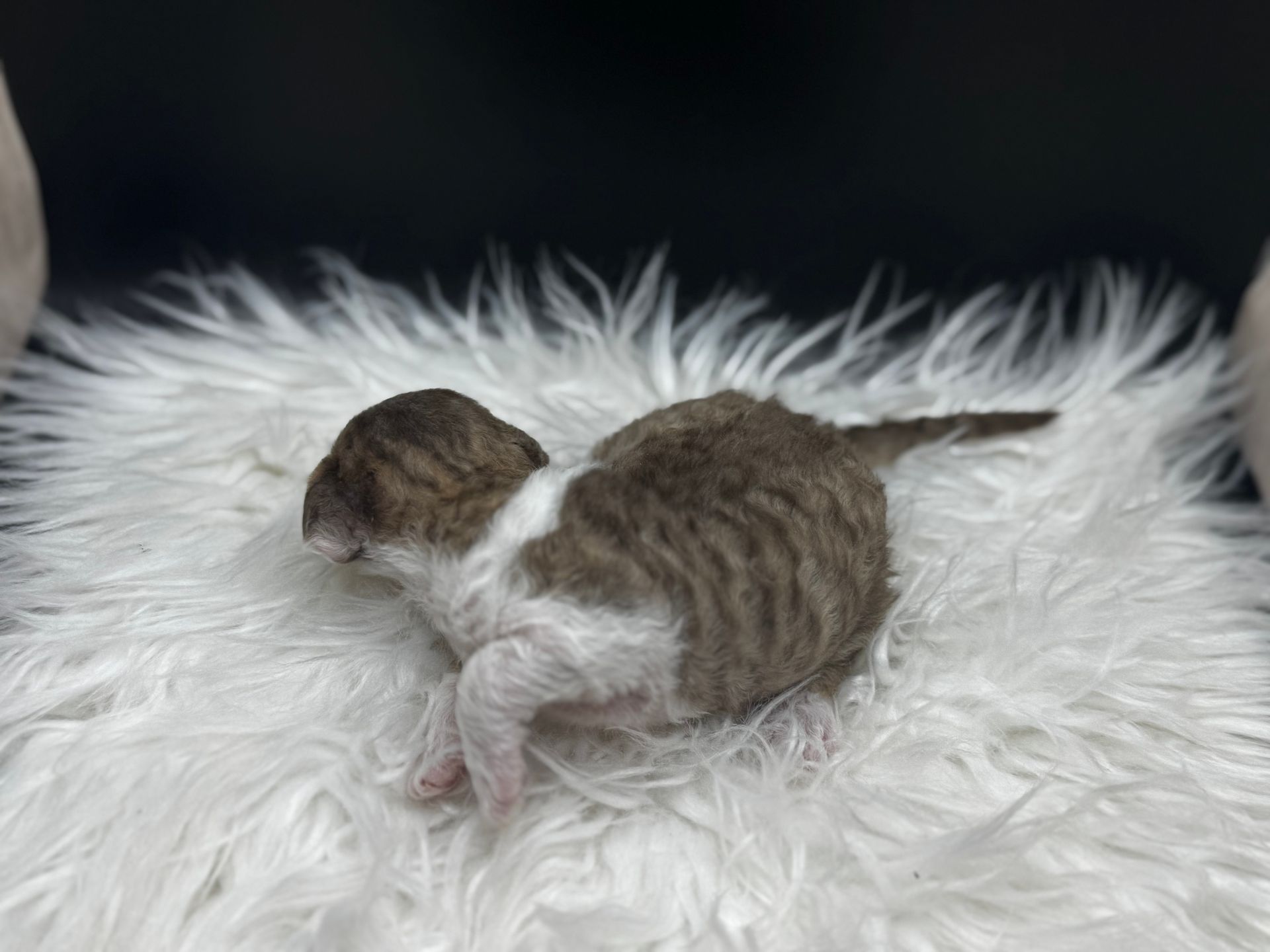Blog
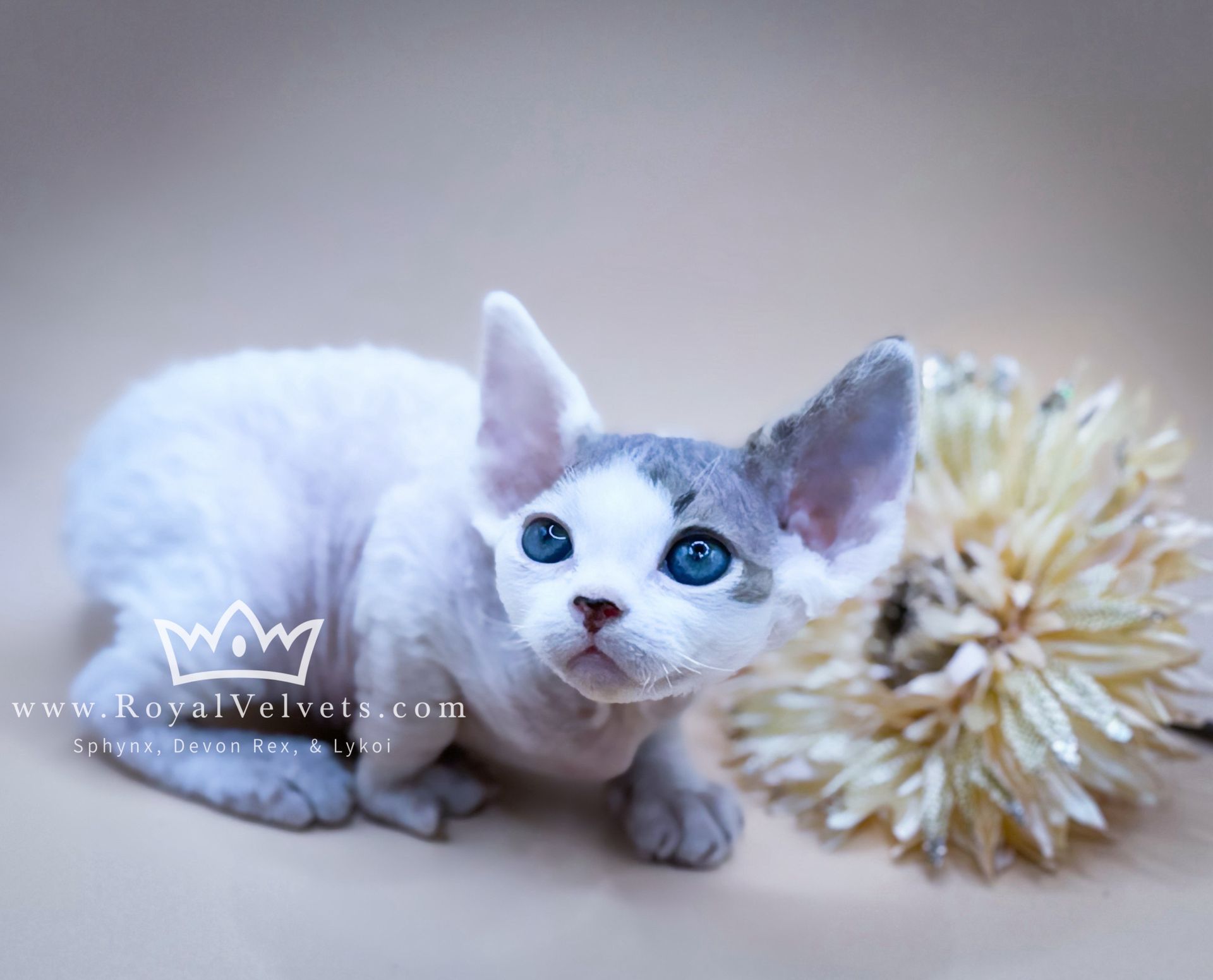
October 10, 2025
At Royal Velvet , we want every kitten to start life with the best protection possible — which is why each of our Sphynx , Devon Rex , and Lykoi kittens goes home with 30 days of free Trupanion pet insurance. Bringing home a new kitten is exciting, but even the healthiest, most well-bred cats can experience accidents or sudden illnesses. With Trupanion, you’ll have peace of mind knowing that if something unexpected happens, you’re covered from day one. 💕 What Does Trupanion Cover? Trupanion provides coverage for: Accidents & Illnesses : From tummy troubles to injuries, Trupanion covers the cost of diagnosing and treating unexpected conditions. Hospitalization & Surgery : In case of emergencies or major health issues. Medications & Diagnostics : Covers prescription treatments, imaging (like x-rays and ultrasounds), and lab tests. Congenital & Hereditary Conditions : Especially important for breeds like the Sphynx and Devon Rex, which can be predisposed to certain genetic conditions such as HCM (Hypertrophic Cardiomyopathy). Chronic Conditions : Lifelong issues like allergies or skin sensitivities can also be covered. What’s not covered: Pre-existing conditions or routine wellness care (like vaccines or parasite prevention). 💲 How Much Does It Cost After the Free 30 Days? Trupanion’s cost varies by breed, age, location, and deductible . You get to choose your deductible, which affects your monthly premium: Lower deductible = Higher monthly cost Higher deductible = Lower monthly cost On average, cat owners report plans ranging between $20–$40 per month , but it’s personalized to each pet. We recommend calling Trupanion directly or visiting their website to get an exact quote for your area and breed. 🏆 Why We Trust Trupanion We’ve partnered with Trupanion because they: Offer instant activation on your kitten’s pick-up day (no waiting period!) Pay 90% of eligible vet bills directly to your veterinarian Have a 24/7 customer service team who truly cares about your pet It’s one of the best ways to protect your kitten and your peace of mind — right from day one. 💬 Final Thoughts We’ve seen firsthand how valuable pet insurance can be — especially with unique breeds like Sphynx and Devon Rex cats, who deserve royal-level care. Activating your free 30-day Trupanion policy ensures your kitten is protected the moment they join your home. After that, you can choose to continue coverage for lifelong protection and peace of mind. 💖 Ready to activate? 👉 Call 855-266-2156 or visit Trupanion’s website and use our partner code BR1RV80219 to enroll your Royal Velvet kitten today.
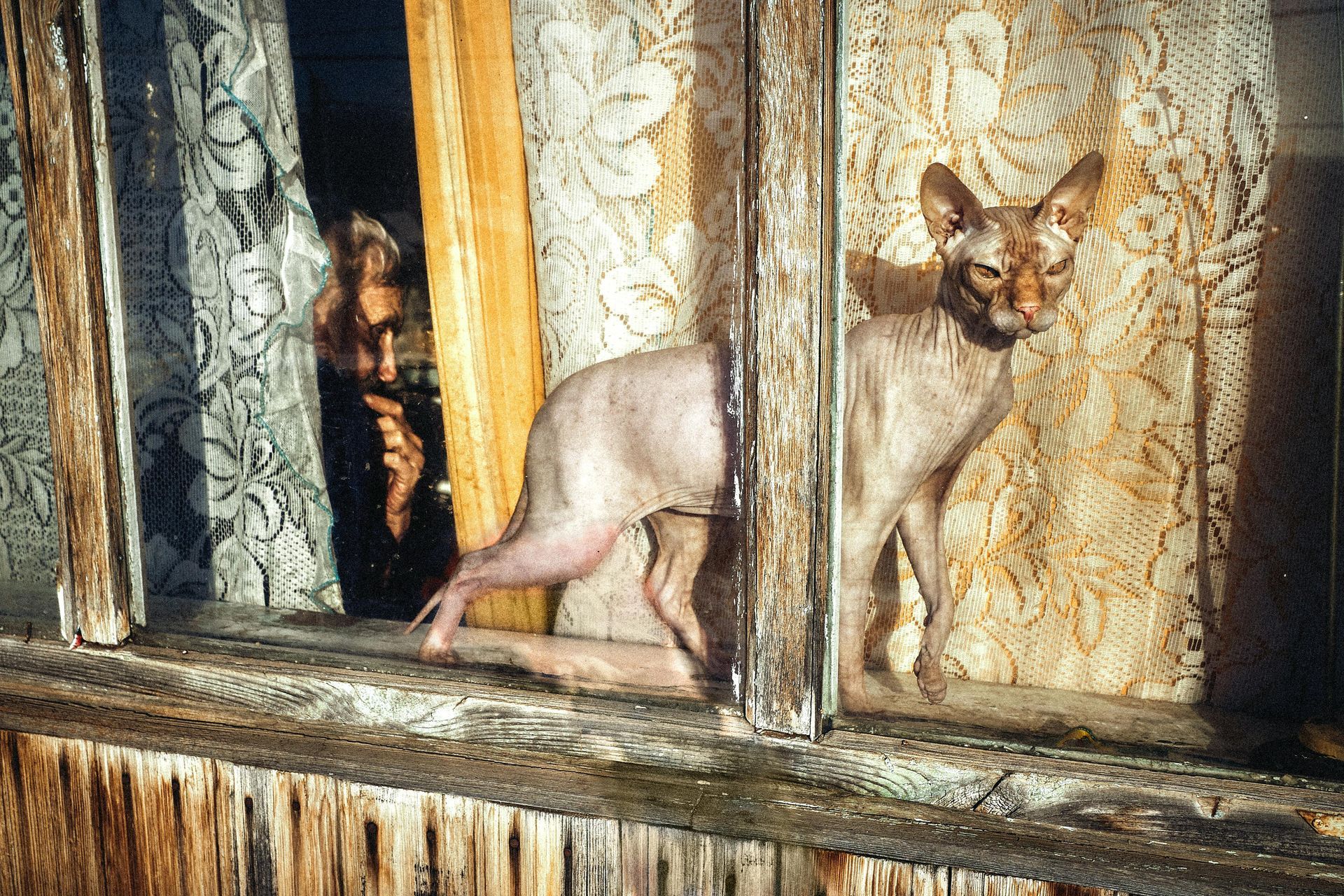
October 2, 2025
Bringing home a Sphynx , Devon Rex , or Lykoi cat is an exciting journey into the world of rare and exotic breeds. These unique cats require special care, and as responsible pet parents, it’s important to understand their needs. This care guide covers everything from skin care to nutrition, helping you give your royal companion the healthiest, happiest life possible. Why Exotic Breeds Require Special Care Sphynx, Devon Rex, and Lykoi cats are very different from typical domestic breeds. They often require veterinarians who are familiar with their unique traits, health considerations, and care routines. At Royal Velvet, we stress the importance of education and preparation before welcoming your exotic kitten home. Essential Facts & Care Tips 1. Coat & Skin Sphynx cats have little to no hair, while Devon Rex and Lykoi cats have fine or sparse coats. Hair thickness and texture can change depending on hormones, seasons, and environment. Their skin produces natural oils that aren’t absorbed by fur, which means they may need occasional baths. But please do not over bathe!! Washing more than once a month is too often and can cause the skin to overproduce the oils. Use Hypoallergenic PH balanced shampoo (never baby shampoo). Avoid sunscreens or lotions — they will lick these off. Instead, use UV sun shirts or lightweight clothing, but allow the skin to breathe. Pro Tip : Many owners say their Sphynx smell like warm potato chips when cozy! 2. Nose & Sinuses Unlike other cats, Sphynx lack nasal hairs, which makes them prone to sneezing. Mild sneezing is normal, but colored discharge, coughing, or wheezing require veterinary care . 3. Ears With no ear hair, Sphynx and some Devon Rex/Lykoi cats collect more oil in the ear canal. Clean weekly with Zymox Cleaner and cotton swabs (never deep inside). Watch for itching, redness, odor, or head shaking, which can indicate infection or mites. 4. Eyes Sphynx kittens open their eyes early (1–5 days old), and without eyelashes, they are prone to tearing. Clear tearing is normal, but colored discharge or squinting requires a vet check . 5. Whiskers Many exotic cats (especially Sphynx) lack whiskers. They may use their paws like hands to sense depth or dip their feet in water to gauge levels. 6. Teeth Sphynx kittens may have brown-stained baby teeth due to porous enamel that absorbs natural oils while nursing. This is harmless and disappears as adult teeth come in. 7. Nails & Grooming Declawing is not recommended — Sphynx and Devon Rex use their paws almost like hands. Trim nails weekly and clean nail beds with baby wipes to remove trapped oil. Bath only when visibly dirty, not on a fixed schedule. 8. Diet & Appetite Exotic cats often have big appetites and fast metabolisms. Keep high-quality food available at all times. Provide access to fresh water (not milk). We recommend: Purina ONE Kitten Dry Food Fancy Feast Wet Food NuVet Plus Supplements for immune and digestive support 9. Litter & Hygiene Best options: Okocat pine pellets or paper pellets. Avoid dusty clay litters — they may irritate sensitive noses and skin. Use metal or ceramic bowls instead of plastic to prevent chin acne. 10. Warmth & Comfort These breeds feel warmer to the touch but have the same core temperature (101–102.5°F) Provide soft blankets, heated beds, or safe clothing in colder months. 11. Parasite & Health Care Fleas are less attracted to hairless cats, but protection is still important. We recommend Revolution for broad parasite control (fleas, ticks, mites, roundworms, mosquitoes). Routine deworming and yearly vet visits are essential. 12. Vaccinations Give kittens time to adjust before additional vaccinations. Stress can trigger sneezing or watery eyes. We recommend spacing vaccines: FVRCP and rabies should not be given on the same day. 13. Heart Health – HCM Hypertrophic Cardiomyopathy (HCM) is a serious heart condition common in Sphynx, Devon Rex, and Lykoi cats. At Royal Velvet, all breeding cats undergo yearly scans with a veterinary cardiologist . Pet owners should continue annual screenings for peace of mind and proactive care. Final Thoughts Sphynx, Devon Rex, and Lykoi cats are extraordinary companions that deserve extraordinary care. With proper nutrition, hygiene, veterinary oversight, and lots of love, your kitten will thrive as the royal family member they were born to be. For more resources, explore our educational blogs: 👉 Proper Kitten Introduction to Their New Home 👉 The Ideal Diet for Your Exotic Kitten 👉 Common Viruses in Kittens & How to Handle Them 👉 Heartfelt Care: Understanding HCM in Cats At Royal Velvet , we are always here to answer questions and guide you through every step of life with your exotic companion. 🐾👑
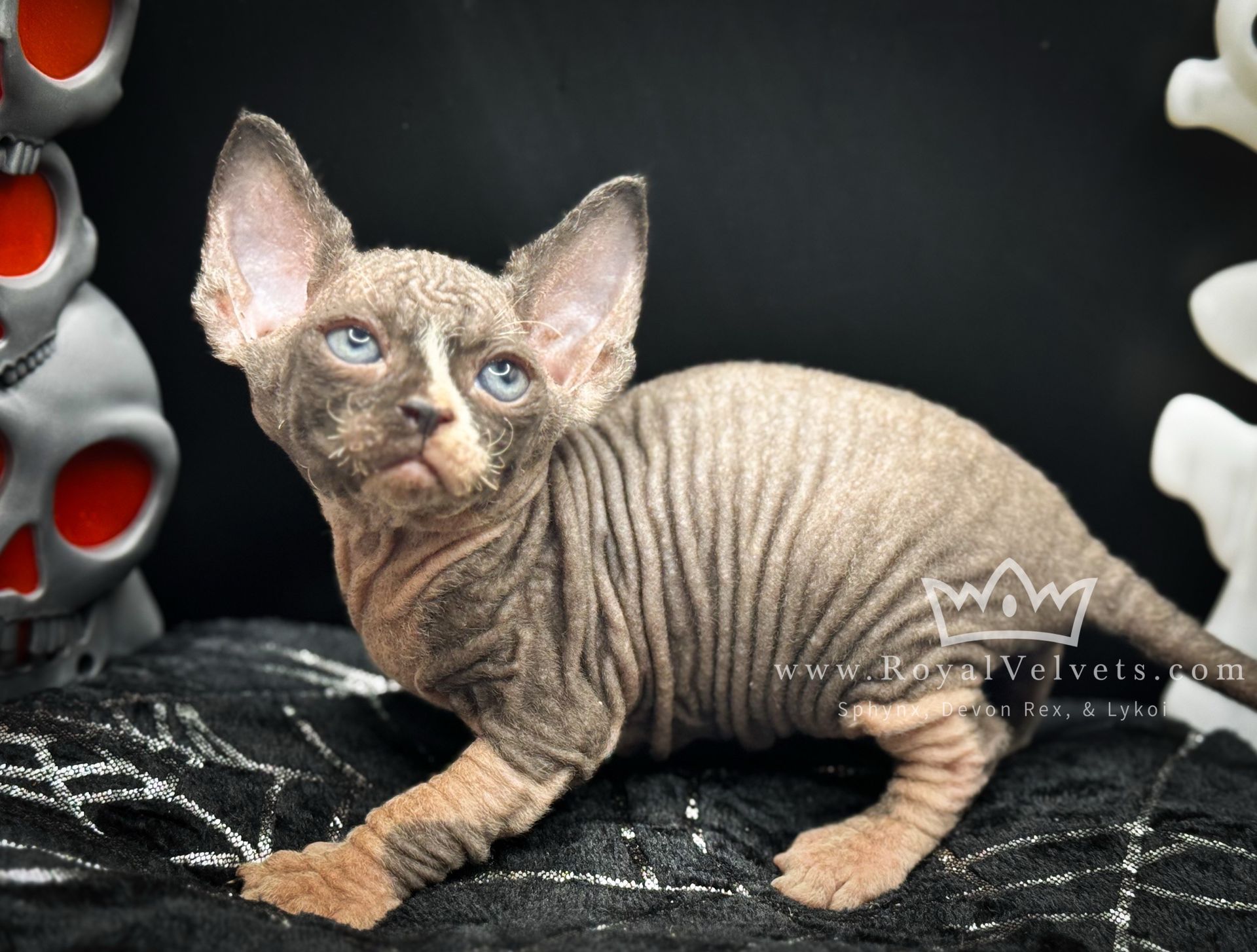
By The Admin Team
•
September 19, 2025
One of the most common questions people ask about Sphynx cats is: “If they’re supposed to be hairless, why does mine have fuzz or patches of fur?” The answer lies in the fascinating genetics of the breed. The “Hairless” Gene Sphynx cats carry a natural genetic mutation in the keratin 71 ( KRT71 ) gene, which changes the way hair develops. Instead of producing a full coat, most Sphynx cats are left with only a soft down, or sometimes no visible hair at all. But the gene doesn’t work the same in every cat—some express it more strongly, while others keep fuzzy patches forever. Growing Up Bald Sphynx kittens are often born with a fine coat of fuzz, called a “kitten coat.” In many cases, this falls out as they mature, leaving them with the iconic smooth Sphynx look. But not every kitten loses it completely. Some retain soft peach fuzz on areas like the ears, nose, tail, or feet. Weather and Warmth Sphynx cats are sensitive to temperature, and their bodies sometimes adapt by growing a bit of fuzz in colder seasons. It’s like nature’s way of providing a little extra insulation when they need it most. Genetics and Lineage Because Sphynx have been carefully outcrossed with other breeds (like the Devon Rex ) to maintain healthy genetic diversity, some lines may naturally express a bit more hair growth. Hormones and Health Occasionally, changes such as spaying/neutering, diet, or other body shifts can affect how much hair your Sphynx grows. Most of the time, this is completely normal. The Bottom Line Not all Sphynx cats are completely bald—and that’s part of their charm! Whether velvet-skinned or sporting a few fuzzy patches, each Sphynx is wonderfully unique.
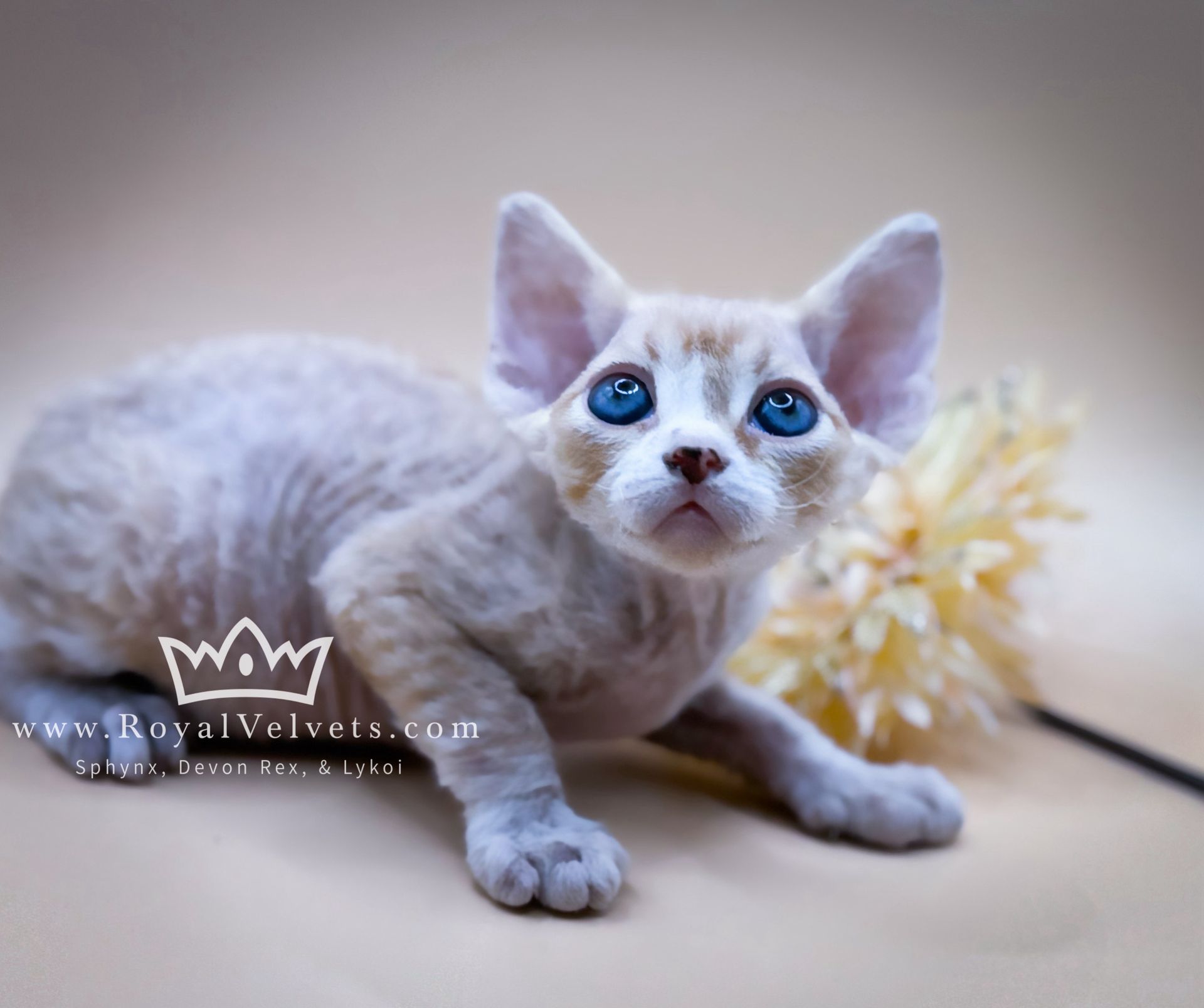
August 26, 2025
What Sets Royal Velvets Apart from Other Breeders? In a world where you can find kittens for sale at every price point, it’s important to ask: why are some cats so much cheaper—and what exactly are you paying for when you choose a reputable breeder like Royal Velvets? Here at Royal Velvets , we understand that choosing a kitten is a deeply personal—and sometimes emotional—decision. But we also believe it’s one that should be rooted in education and intention. The truth is, when it comes to breeding, you really do get what you pay for. And in the case of discounted kittens, “cheap” can quickly become very costly—in terms of both finances and heartbreak. Not Just Breeders—Preservers of the Breed One of the key things that sets us apart is our why. We don’t breed Sphynx , Devon Rex , and Lykoi cats because it’s a quick paycheck. In fact, when breeding is done ethically and responsibly, it rarely results in profit. That’s because real breeding—breeding that’s done for the betterment of the breed—takes time, commitment, extensive testing, and a whole lot of heart. Sadly, many people enter the world of breeding with no long-term vision or real understanding of the responsibility it carries. They cut corners, breed unhealthy cats, or skip essential testing to save money and increase profit. But cats aren’t commodities. They’re living, breathing beings who deserve to come into the world intentionally, not opportunistically. Health, Lineage, and Integrity—Always At Royal Velvets, we go above and beyond to ensure the health and wellbeing of our kittens—and their parents. We do: ✅ Extensive health testing on all of our breeding cats ✅ HCM, FIP, and congenital condition screening ✅ Blood Work prior to any surgery ✅ FELV/FIV testing and fecals with cytology ✅ Pedigree tracking and line consistency for generations ✅ Microchipping, spay/neuter, health guarantees, & more We also work closely with like-minded breeders who share our goals of maintaining healthy lines and introducing only well-tested diversity when appropriate. Even with all of this care, we still acknowledge that there are no absolute guarantees. These are still animals—and just like humans, things can arise. But when they do, we are here. Every single step of the way. What Comes with a Royal Velvet Kitten? When you adopt a kitten from Royal Velvets, you’re not just getting a beautiful, well-socialized companion. You’re getting: ✨ Full transparency—we share all our testing with you ✨ Spay/neuter already done, saving you both cost and stress ✨ Bloodwork done prior to surgery, to ensure your kitten is healthy ✨ Microchipped and ready for safe identification ✨ FELV/FIV tested, cytology, and fecal—all clear before going home ✨ 3-year congenital HCM/FIP health guarantee ✨ 30 days of free pet insurance ✨ A loaded go-home bag with essentials to get you started ✨ Lifetime breeder support—you’re part of the Royal Velvets family ✨ A community of fellow Royals—a network of love and support More Than a Pet—A Promise When you bring home a Royal Velvets kitten, you’re not just buying a pet. You’re investing in peace of mind, in a legacy of healthy lines, and in the unwavering support of a breeder who cares deeply about every kitten born here. We aren’t just sending you home with a cat—we’re sending you home with our heart. If you’re looking for a cheap cat, we may not be the right fit—and that’s okay. But if you’re looking for a healthy, responsibly bred kitten raised with love, integrity, and a long-term commitment to the breed and the family they join—then welcome home.
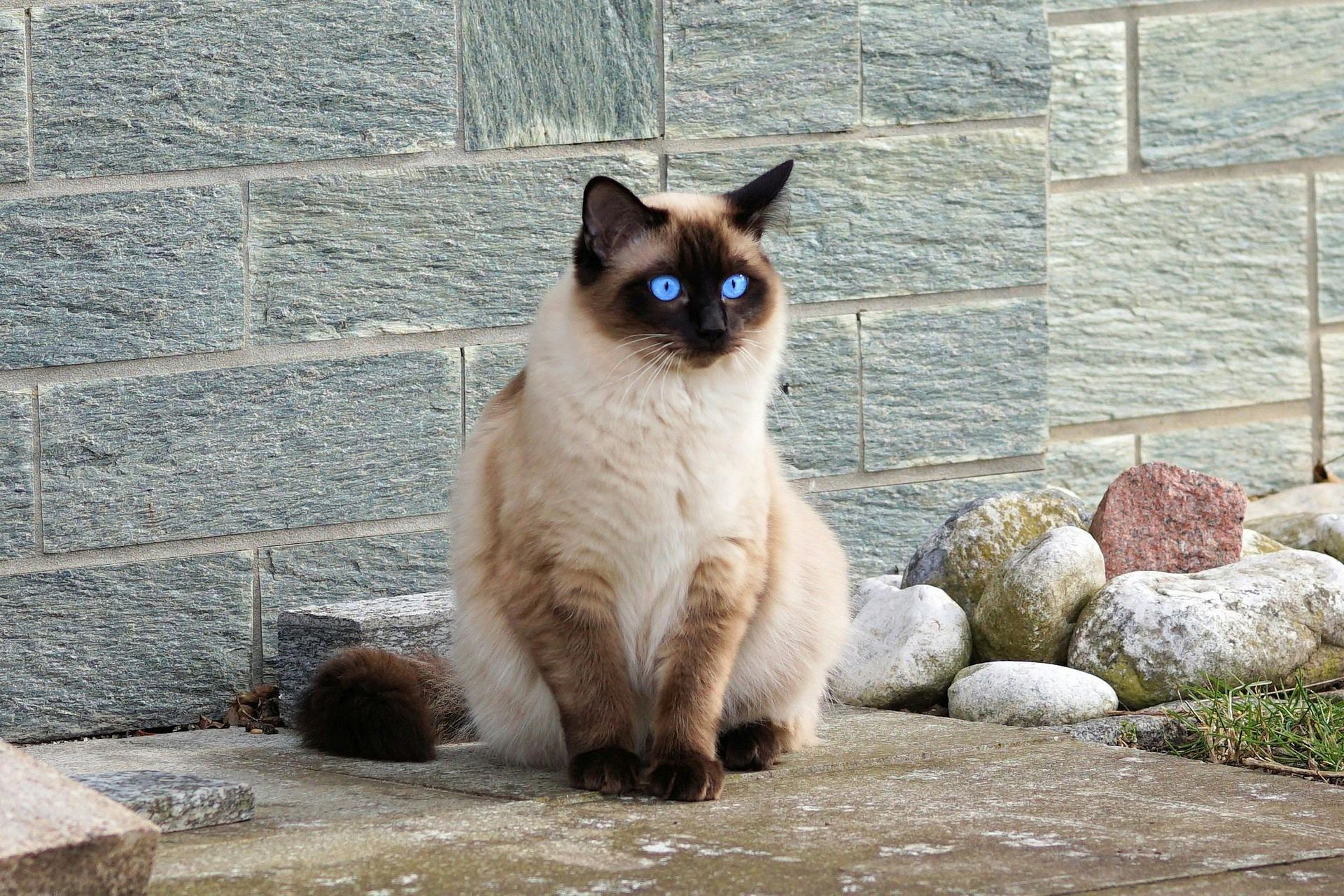
April 15, 2025
The point gene is responsible for the striking coat patterns seen in breeds like Siamese, Ragdolls, and Himalayans. This fascinating genetic trait is governed by a recessive gene, which means that for a kitten to inherit and express the pointed pattern, both parents must carry and pass on a copy of the gene. How the Point Gene Works The point gene is a form of temperature-sensitive albinism caused by a mutation in the TYR gene. This mutation affects pigmentation, restricting color development to the cooler areas of the body—such as the ears, face, paws, and tail—while the warmer areas remain lighter. This is why pointed cats have a distinctive contrast between their body and extremities. Interestingly, kittens are born completely white because they develop inside the warmth of their mother’s womb. As they grow and their body temperature regulates, their points begin to darken, revealing their final color pattern over the first few weeks or months of life. The Recessive Nature of the Point Gene Since the point gene is recessive, a kitten must inherit two copies—one from each parent—to display the pattern. If a cat inherits only one copy, it will not be pointed but will still carry the gene and can pass it on to future offspring. Genetic Possibilities in Breeding Understanding how the point gene is passed down can help breeders predict the likelihood of pointed kittens in a litter: Two non-pointed parents (who do not carry the gene) = No pointed kittens. One pointed parent + one non-pointed parent (who does not carry the gene) = No pointed kittens, but all will be carriers. One pointed parent + one non-pointed parent (who carries the gene) = About 50% of the kittens may be pointed, and the rest will be carriers. Two carriers (not visibly pointed) bred together = About 25% of the kittens may be pointed. Two pointed parents bred together = 100% of the kittens will be pointed. Because of this inheritance pattern, pointed kittens can sometimes appear unexpectedly in litters if both parents secretly carry the gene but do not show it themselves. This is why genetic testing is such an important tool for breeders—it helps identify hidden traits and allows for informed breeding decisions. Why Understanding the Point Gene Matters By understanding the genetics behind the point gene, breeders can make strategic choices to maintain genetic diversity while preserving this unique and beautiful trait. Whether you are a breeder, a cat enthusiast, or just someone fascinated by feline genetics, the point gene serves as a perfect example of how science shapes the incredible variety we see in our feline companions.
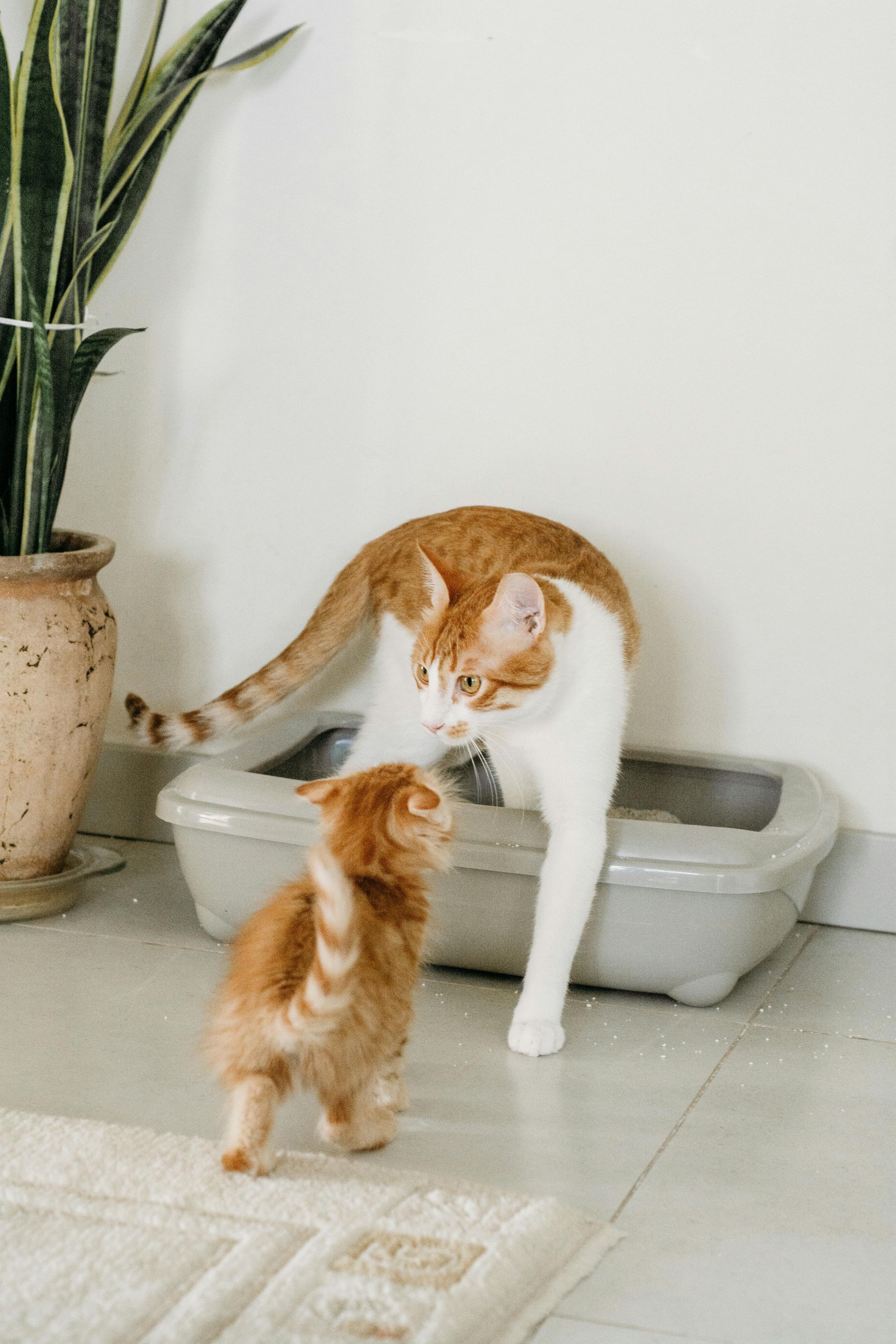
April 15, 2025
Bringing home a new kitten is such a joyful and exciting experience—but it can also come with a lot of questions, especially when it comes to litter box training. Thankfully, if you’re bringing home one of our kittens, they’re already litter box trained! However, continuing their good habits at home depends on setting them up for success with the right kind of setup. Start Simple: The Only Litter Box You Need Right Now We train all of our kittens on a standard, open, rectangular litter box filled with pine pellet litter. It’s natural, safe, effective, and easy for kittens to use. We strongly recommend continuing this exact setup when your kitten first comes home. Avoid the temptation to use: Covered or lidded boxes Top-entry or flat entry boxes Fancy self-cleaning or automatic litter boxes These styles can confuse or even frighten a kitten who’s adjusting to a brand-new environment. It’s essential to keep things familiar and straightforward during this important transition. Why Not Covered or Automatic Boxes? Covered boxes may trap odors and make the experience uncomfortable or intimidating for a kitten. Top-entry boxes can be physically challenging for tiny legs, and automatic litter boxes can be downright dangerous for small kittens. In fact, many off-brand automatic boxes have caused serious injuries—and in rare cases, even deaths—because they cycle while the kitten is still inside or don’t properly detect that the box has been used. Many automatic boxes are also simply too large or high for a small kitten to comfortably access. When You’re Ready to Transition to Something New We understand that long-term, some families prefer different litter box styles. Once your kitten has fully settled into their new home and is reliably using their box, you can start introducing a new litter box setup. The safest and most effective way to do this is: Set the new box beside the old one. This gives your kitten the opportunity to explore it on their own. Place a small amount of used litter or a piece of feces from the old box into the new one. The scent helps them understand its purpose. Use a kitten attractant litter if your new box takes a different type of litter. Let your kitten explore the new setup at their own pace. Some kittens may switch quickly; others may need a bit more time. Just be patient and keep both boxes available during the transition. Your Kitten’s Comfort and Safety Comes First Every kitten deserves a safe, easy-to-use, and familiar bathroom setup—especially in those first few weeks at home. Sticking with the basics and avoiding complications is the best way to ensure a smooth adjustment. Once your kitten is confident and comfortable, you can always upgrade or transition later. Have questions about litter boxes or anything else kitten-related? We’re always here to help!

June 4, 2024
Sphynx kittens , known for their distinctive lack of fur, along with Lykoi and Devon Rex breeds, have intrigued and captivated cat lovers around the world. Originating in the 1960s in Canada from a natural genetic mutation, these unique felines challenge traditional perceptions of pet aesthetics and care. Embracing the sphynx means understanding their need for warmth, regular bathing, and human companionship. This breed's playful and affectionate nature makes them more than just pets; they're family members who demand attention and love. If you're considering bringing a sphynx kitten into your home , prepare to be charmed by their endearing personalities and unforgettable appearance. Key Takeaways Sphynx kittens require a diet that caters to their unique nutritional needs , emphasizing the importance of understanding these requirements to ensure their health and vitality. Incorporating a raw diet can offer significant advantages for Sphynx kittens by providing them with essential nutrients in a form closely resembling their natural dietary intake. It's crucial to customize diets not just based on the breed but also considering the individual health conditions and preferences of each Sphynx kitten, underlining the need for personalized nutrition plans . Adopting a balanced diet approach is key, combining both raw and processed foods to create a comprehensive feeding plan that covers all nutritional bases for a growing Sphynx kitten. For owners with different lifestyles, exploring alternative feeding options that still meet the nutritional demands of Sphynx kittens can ensure their well-being without compromising convenience. Transitioning Sphynx kittens to new diets or supplementing their meals should be done gradually and with careful monitoring to avoid digestive issues and ensure they receive all necessary nutrients. Understanding Unique Dietary Needs High-Protein Diet Sphynx kittens have a high metabolism . This trait demands a diet rich in proteins. Such a diet supports their energy levels and growth needs. Owners should choose foods specifically formulated for high-energy breeds. These foods ensure the kittens' muscle development and overall health are well-supported. Frequent Feeding Their rapid metabolism also means Sphynx kittens need to eat more often. Unlike other breeds, they benefit from smaller, more frequent meals throughout the day. This feeding schedule helps maintain their energy levels consistently. It prevents them from feeling overly hungry or experiencing dips in energy. Hydration Importance Staying hydrated is crucial for Sphynx kittens. Their unique physiology makes proper hydration even more essential than for other cats. Owners can encourage water intake by providing fresh water at all times. Incorporating wet food into their diet can help increase their water consumption. Exploring the Raw Diet Advantage Healthy Skin Raw diets play a pivotal role in promoting healthy skin and coat, especially vital for Sphynx kittens. These hairless wonders, specifically Sphynx cats, require extra care to keep their skin supple and free from issues. A diet rich in raw meats provides essential fatty acids, contributing to a smooth and hydrated skin surface. Owners notice a remarkable difference in their kitten's skin texture within weeks of switching to raw foods. This change not only enhances the Sphynx Cattery kitten's appearance but also its overall well-being. Digestive Health Mimicking a natural feeding environment, raw diets support optimal digestive health . Sphynx cats, with their sensitive stomachs, benefit greatly from the easily digestible nature of raw food. This diet reduces the risk of gastrointestinal problems common among domestic cats. It ensures that your Sphynx kitten absorbs all the necessary nutrients efficiently, promoting robust health. Safety Measures Despite its benefits, transitioning to a raw diet comes with its concerns. Proper handling and preparation are crucial to avoid bacterial contamination. Owners should follow strict hygiene practices when preparing meals. Consulting with a veterinarian before making dietary changes is advisable. They can provide tailored advice ensuring the diet meets all nutritional needs while addressing any potential risks. Customizing Diets for Each Breed Nutritional Needs Sphynx kittens require more calories than their furry counterparts. Their lack of coat means they lose more body heat. To compensate, their diet must be rich in calories. They thrive on high-protein and moderate-fat diets. These nutrients support their energetic nature and help maintain body temperature. Breed Comparison Unlike the common domestic cat, Sphynx kittens have unique dietary needs. For instance, a typical kitten might do well on a standard kitten formula. However, a Sphynx's diet should lean towards higher calorie content. This breed's metabolism runs faster. It processes food at an accelerated rate to sustain body warmth and vitality. Portion Control Adjusting portion sizes is crucial for Sphynx kittens. Overfeeding can lead to obesity, while underfeeding may not meet their energy demands. Veterinarians recommend frequent, measured meals rather than free-feeding. This approach ensures they get enough nutrients without excessive weight gain. Nutrient ratios should also be tailored to individual health needs. A balance of proteins, fats, and carbohydrates is key to supporting their active lifestyle and metabolic requirements. Adopting a Balanced Diet Approach Nutrient Essentials A balanced diet is crucial for a Sphynx kitten's health. It must include proteins, fats, vitamins, and minerals . These nutrients support their energetic nature and help maintain healthy skin, which is vital for a hairless breed. Proteins are the building blocks of muscle and essential for growth. Fats provide energy and keep the skin supple. Vitamins and minerals support overall health, ensuring that your Sphynx kitten thrives. Specialized Foods Commercial cat foods formulated for hairless breeds like the Sphynx are available. They contain higher levels of certain nutrients to support skin health. Choosing these specialized foods can make a big difference in your pet's well-being. They are designed to meet the unique dietary needs of hairless cats, providing a tailored nutritional approach . Label Literacy Reading pet food labels is key to ensuring a balanced diet. Look for high-quality protein sources listed at the top of the ingredients list. Avoid foods with excessive fillers or by-products. These can detract from the nutritional value of the food. Instead, opt for products with clear ingredient lists that specify meat types and nutritious additives. Choosing Alternatives for Every Lifestyle Busy Owners For those with packed schedules, high-quality commercial diets offer a straightforward solution. These products are crafted to cater specifically to the Sphynx's nutritional needs. They balance convenience with the necessity for a diet that supports their high energy levels and unique metabolism. Pet owners can find these diets in various forms, including dry kibble or wet food. Each provides a complete meal, ensuring your Sphynx kitten grows up healthy and strong without demanding much of your time. Homemade Diets Crafting homemade meals allows for customization to suit your Sphynx's preferences and health requirements. This approach demands more time and knowledge but pays off by giving you full control over the ingredients. You can include lean meats, fish, and specific vegetables known to be beneficial for cats. However, it's crucial to consult with a veterinarian or a feline nutritionist to create a balanced meal plan. This ensures your kitten receives all necessary nutrients without any harmful extras. Freeze-Dried Raw Freeze-dried raw diets present a middle ground between traditional raw feeding and the convenience needed by modern pet owners. These diets maintain most of the nutritional benefits of raw food while eliminating pathogens through the freeze-drying process. They're easy to store and prepare, making them an excellent option for those interested in raw feeding but wary of its usual drawbacks. Plus, many Sphynx kittens find the texture and taste appealing. Transitioning and Supplementing Effectively Gradual Introduction Introducing new foods to a Sphynx kitten requires careful consideration . Start by mixing a small amount of the new food with their current diet. Increase the new food gradually over a week. This method helps prevent digestive issues, ensuring a smooth transition for your kitten. Sudden changes can upset their stomachs. Monitor their reaction closely. If they show any signs of distress, slow down the process. Essential Supplements Omega fatty acids stand out for enhancing skin health in Sphynx kittens. Incorporate supplements rich in omega-3 and omega-6 into their diet. These nutrients support a healthy coat, reduce inflammation, and boost overall wellness. Consult with a vet before adding any supplements. They can recommend the right type and dose for your kitten's needs. Regular Check-ups Veterinary visits are crucial for tailoring your kitten's diet as they grow. Regular check-ups help identify any nutritional gaps or health concerns early on. During these visits, discuss your kitten's dietary needs based on their development stage and activity level. Your vet might suggest adjustments to ensure optimal growth and health. Closing Thoughts Navigating the dietary needs of your Sphynx kitten might seem daunting at first, but understanding their unique requirements and the benefits of a raw diet can make a world of difference. By customizing their meals to fit their specific breed needs and adopting a balanced diet approach, you'll ensure they grow up healthy and strong. Remember, choosing the right food alternatives and effectively transitioning and supplementing their diet are key steps towards a happy and nourished pet. Your journey doesn't stop here. Dive deeper into learning about your feline’s nutritional needs and explore more ways to enhance their well-being. Your commitment to their health shows in every meal you prepare. Ready to take the next step? Start by reviewing your Sphynx kitten's current diet today and see where you can implement these insights for a thriving, joyful companion. Frequently Asked Questions

May 9, 2024
Ever wondered where to find a Sphynx cat for sale in Nashville, TN ? The quest for a unique pet often leads many to the distinctive charm of the Sphynx cat. Known for their playful personality and hairless appearance, these felines offer an unparalleled companionship. In Nashville, the search for a feline friend like a Sphynx cat can seem daunting amidst the city's bustling pet scene, but with the right guidance and understanding of what makes these cats such a special addition to any home, finding your next feline friend can be a smooth and exciting journey. Key Takeaways When searching for a Sphynx cat for sale in Nashville, TN, prioritize finding reputable breeders who provide comprehensive post-adoption support and health guarantees. Understanding the unique characteristics of Sphynx cats , including their hairlessness and personality traits, is crucial before making a commitment to adopt. The adoption process for a Sphynx cat involves several steps, including choosing the right breeder, meeting the kitten, and understanding the care requirements of these special pets. Health and wellness are paramount for Sphynx cats due to their specific needs; prospective owners should be prepared for regular vet visits and specific grooming routines. For first-time Sphynx owners, seeking guidance from experienced breeders and joining community groups can offer invaluable support and advice. Always ensure that the available kittens come from ethical breeding practices that prioritize the health, well-being, and socialization of the cats over profit. Discovering Sphynx Cats Origins Sphynx cats stand out due to their hairless appearance. They originated in the 1960s through natural genetic mutation, becoming a site for those with cat allergies to find a feline friend. This breed's unique look sparks interest and curiosity. They are known for their energetic and affectionate nature. Unlike other cats, Sphynxes seek warmth and companionship, often found cuddling with their owners. Traits Their hairlessness is not just a visual trait; it impacts their care needs and cat allergies. Sphynx cats require regular bathing to remove oil buildup on their skin. Despite the lack of fur, they are not truly hypoallergenic but can be easier on allergy sufferers than other breeds. These feline friends boast a playful and loving demeanor. They form strong bonds with their families, making them excellent companions. Misconceptions Some believe Sphynx cats are high-maintenance or have poor litter box habits. However, with proper care and attention to their litter box aversion, these issues can be managed effectively. Contrary to some opinions, Sphynx cats are not aloof but rather highly social and enjoy being involved in family activities. Available Hairless Kittens Breed Variety Hairless kittens come in various breeds, including Sphynx, Bambino, Dwelf, and Elf. Each breed has unique features and personalities that cater to different preferences. Breeders in Nashville offer a wide range of colors and eye colors. This variety ensures potential owners can find a kitten that matches their aesthetic preferences. Selecting Kittens Choosing the right kitten involves considering lifestyle and personal preferences. For those with cat allergies, hairless cats are often touted as hypoallergenic pets. However, it's crucial to spend time with the cat before making a decision, as some people may still react to their saliva. The selection process also includes considering the space for litter boxes and the kitten's activity level. Each breed has its own need for engagement and space to explore. Socialization Importance Early socialization plays a critical role in developing a loving and cuddly nature in hairless kittens. Breeders in Nashville emphasize this aspect, ensuring each kitten is well-adjusted to human interaction. This early bonding makes them ideal companions for families or individuals seeking affectionate pets. Adoption Process Overview Initial Inquiry After finding a Sphynx kitten you're interested in from available hairless kittens , the first step is to reach out to the cattery . They will provide detailed information about the kittens, including their health status and personality traits. This initial communication is crucial for both parties to ensure a good match between the kitten and its potential new family. It's also an opportunity to ask questions about Sphynx cat care, which is vital due to their unique needs. The cattery aims to build a relationship of trust and understanding with prospective owners from the start. Application Submission The next step involves submitting an application . This form helps the cattery assess if your home environment and lifestyle are suitable for a Sphynx cat. It includes questions about previous pet ownership, your living situation, and how you plan to care for the cat. Meeting & Finalization If your application is approved, a meeting will be arranged. This can be either virtual or in-person, depending on location and logistics. During this meeting, you can interact with the kitten and ask any remaining questions. Once everything is agreed upon, you'll proceed with finalizing the adoption. This includes signing an adoption contract that outlines the responsibilities of owning a Sphynx cat and arranging for payment. Bringing Kitten Home Finally, it's time to bring your new family member home. The cattery provides guidance on transitioning the kitten to its new environment and offers support for any questions that arise after adoption. Choosing Reputable Breeders Experience Matters Finding a Sphynx cat for sale in Nashville, TN , requires careful consideration of the breeder's experience. A Nashville cattery with over 20 years in the business stands out. This longevity signals a commitment to breeding healthy and well-socialized cats. Experience breeds expertise. Breeders with decades under their belt know how to care for Sphynx cats properly. They prioritize health and socialization from birth. Transparency Key When scouting for a reputable breeder, transparency is crucial. Look for breeders who are open about their breeding practices and health screenings. They should provide comprehensive health guarantees for their kittens. A trustworthy breeder welcomes questions. They should be eager to share information about the kitten's lineage and health history. Positive Reviews Positive feedback from previous buyers is invaluable. It offers insights into the breeder's reputation within the community. Seek out breeders with glowing testimonials across various platforms. Reviews reflect customer satisfaction. They highlight the breeder's reliability and quality of care provided to their cats. Visit Cattery If possible, visit the cattery in person. This allows you to observe the living conditions firsthand and meet the kittens and breeders. A visit can reveal much about a breeder's operations. It shows how well they maintain their facility and treat their animals. Unique Characteristics of Sphynx Physical Traits The Sphynx stands out primarily for its lack of fur. This unique feature gives it a distinct appearance and a warm, soft skin that feels like suede. Their hairlessness ranges from completely bald to a fine peach fuzz covering their body. This variation includes the "rubber bald" which is completely smooth, and the "sticky bald," slightly tacky to the touch. They have muscular bodies, wide-set eyes in vibrant hues, and large ears that give them an alert demeanor. The variety in eye color can be striking, with shades ranging from deep blue to emerald green. Personality Quirks Sphynx cats are known for their affectionate behavior and loyalty to their owners. They crave attention and interaction, making them excellent companions. Their playful nature and intelligence mean they're always up for games or learning tricks. These cats often follow their owners around the house, showing a level of curiosity and sociability not seen in all cat breeds. They communicate through meows, purrs, and body language, often seeking warmth by snuggling close to their humans. Special Care Needs Owning a Sphynx requires understanding their special care needs. Their hairless skin is prone to oil buildup and requires regular bathing to prevent skin issues. Sun exposure must be limited to avoid burns, highlighting the importance of indoor living spaces. Temperature regulation is crucial as they lack fur; keeping your home warm or providing sweaters during colder months can keep them comfortable. Regular vet check-ups ensure they remain healthy, focusing on heart health due to breed-specific concerns. Health and Wellness Tips Skin Care Proper skin care is crucial for a Sphynx cat's health. They need regular baths to remove oil buildup. Use gentle, cat-specific shampoos. Patience is key when bathing them. Their skin can be sensitive. Ensure they're thoroughly dried afterwards to prevent colds. Diet Needs Sphynx cats have high metabolism rates. They require a nutritious, balanced diet to stay healthy. Look for high-quality cat food. It should meet their energy needs. Consult your vet for personalized advice. Exercise Routine Keep your Sphynx cat active and engaged. Create play areas in your home. Use boxes and toys to encourage movement. This boosts their heart health and overall well-being. Regular Check-ups Schedule frequent veterinary visits. These are vital for vaccinations and preventive care. Hairless breeds like the Sphynx are prone to certain health issues. Early detection through regular check-ups can make a big difference. Comfortable Environment Maintaining a warm environment is essential. Sphynx cats lack fur, which can make them susceptible to cold. Provide warm bedding and safe spaces where they can retreat. This will ensure their comfort and safety at all times. First-Time Owner Guidance Home Setup Preparing your home for a Sphynx cat involves more than just buying toys and a bed. These cats love warmth, so invest in cozy blankets and consider a heated bed. Ensure your home is draft-free and maintain a warm environment. Sphynx cats are curious. Secure loose wires and small objects they might swallow. A dedicated space helps them feel safe. Include scratching posts to keep their nails in check. Training Tips Patience is key when training your Sphynx kitten. Start with simple commands like 'come' or 'sit'. Use treats as rewards. Consistency helps them learn faster. Socializing your Sphynx is crucial. Introduce them to new people, pets, and environments gradually. Positive experiences build confidence and reduce anxiety. Care Resources For further learning, several resources stand out: The International Cat Association offers detailed care guides. Blog posts can provide comprehensive insights. Online forums and social media groups connect you with experienced Sphynx owners for advice and support. Remember, every cat has unique needs. Observe your pet closely to tailor care accordingly. Post-Adoption Support Importance Cattery Commitment After bringing a Sphynx cat into your Nashville home, the journey doesn't end. The cattery's commitment to post-adoption support is crucial. They remain available for any questions or concerns you might have. This ongoing support ensures your Sphynx cat adapts well to its new environment. Owners often have queries about care specifics, from diet to grooming needs unique to Sphynx cats. Breeders can provide tailored advice based on their extensive experience. This direct line of communication helps tackle issues promptly, ensuring your pet's health and happiness. Supportive Community Joining a community of Sphynx cat owners in Nashville brings numerous benefits. It allows you to connect with others who share similar experiences. Such communities offer invaluable advice and emotional support. They can be found online or through local pet groups. Here, you can share stories, celebrate milestones, and even organize meetups. This network becomes a vital resource for both seasoned and first-time owners. Regular Communication Maintaining regular communication with the breeder is essential. They appreciate updates on the cat's health and development. Sharing milestones also helps breeders improve their breeding programs. This two-way communication fosters a strong relationship between breeders and owners. It contributes to the overall wellbeing of your Sphynx cat by ensuring they receive the best possible care throughout their life. Summary Embarking on the journey to bring a Sphynx cat into your Nashville home, you've navigated through discovering these unique pets, understanding what's available, and grasping the adoption process. You've learned how crucial choosing reputable breeders is, delved into the distinct characteristics of Sphynx cats, and armed yourself with health and wellness tips alongside first-time owner guidance. The importance of post-adoption support has been highlighted, ensuring you're fully prepared for this rewarding commitment. This guide aims to make your path to Sphynx cat ownership as smooth as possible, emphasizing the joy and companionship these remarkable creatures bring. Ready to take the next step? Dive into the world of Sphynx cats with confidence, knowing you're well-informed thanks to your research and preparation. Remember, adopting a pet is a lifelong commitment that enriches your life in countless ways. Don't wait any longer; start your search for a Sphynx kitten in Nashville today and embark on an unforgettable adventure with your new feline friend. Frequently Asked Questions
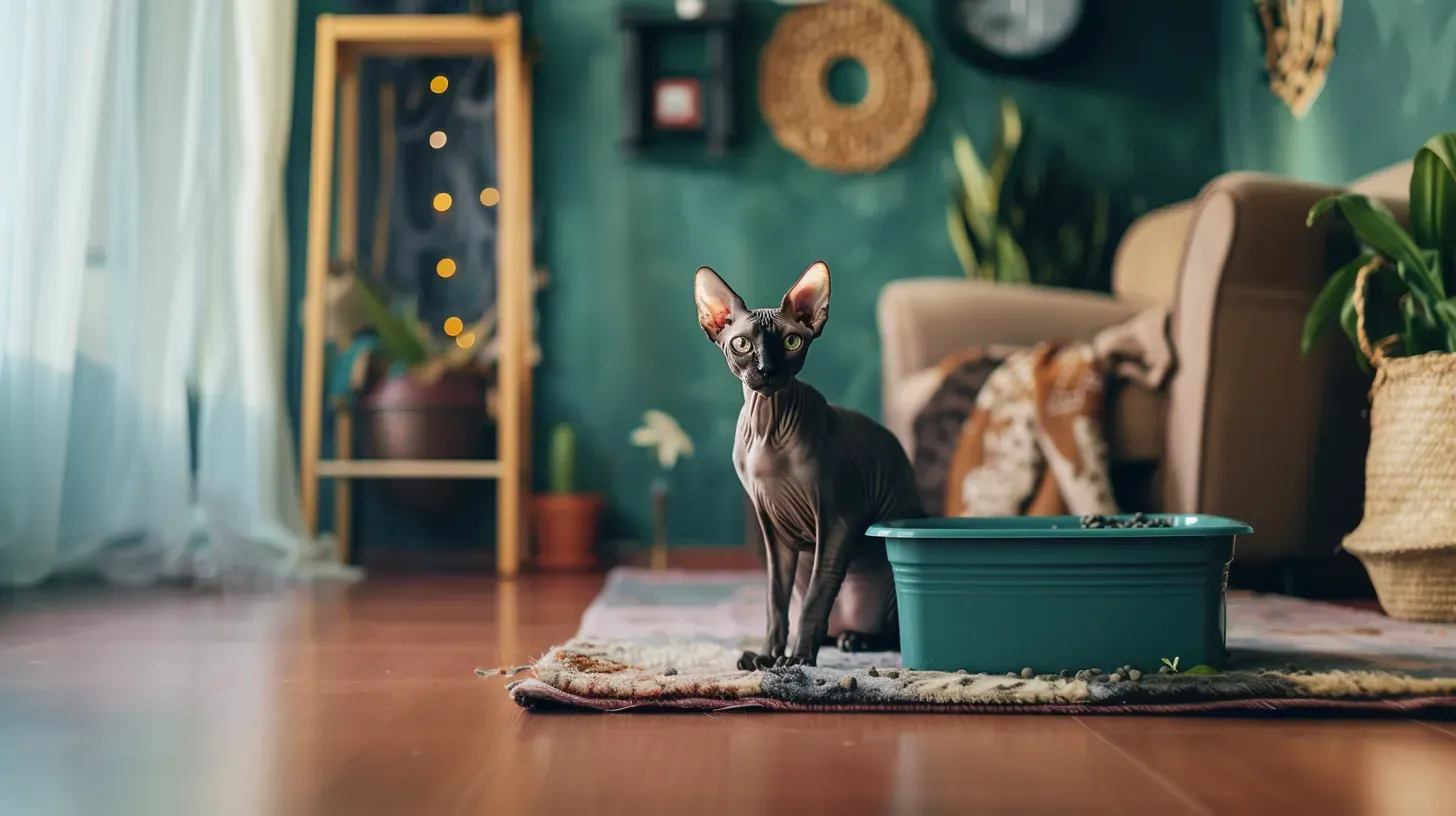
March 1, 2024
If you've ever found yourself puzzled by your feline friend's litter box boycott, you're certainly not alone. Here in Spring City, TN, even amidst the tranquility that envelops our cattery , we've encountered our fair share of litter box conundrums. Whether you hail from the vibrant heart of Nashville, Knoxville, Chattanooga, or the serene landscapes that embrace our cattery, understanding your cat's litter box habits is pivotal. It's the first step toward fostering a harmonious living environment, where the air is filled with nothing but purrs and contentment. Understanding Cat Behavior and Litter Box Basics When cats sidestep their litter boxes, it's a glaring red flag that something's off-kilter. This deviation from the norm can spring from a myriad of sources – from the straightforward displeasure of a soiled box to the intricate web of health concerns. Stress, an all-too-common antagonist, can be triggered by the slightest of shifts within their domain – be it the introduction of a new feline cohort or a seemingly innocuous rearrangement of furniture. Piecing together this puzzle necessitates a keen eye for behavioral shifts and an unwavering dose of patience. Breed-Specific Insights The Enigmatic Sphynx The Sphynx , with their captivating aura of naked elegance, harbor a preference for pristine cleanliness, thanks in part to their furless charm. Their exposed skin makes them more susceptible to the discomforts of an unkempt litter area. In our nurturing confines, we've honed the art of catering to their predilections – employing softer, more forgiving litters and adhering to a regimented cleaning schedule. For those mulling over a Sphynx adoption, rest assured, these captivating creatures come with a well-tutored penchant for hygienic bathroom routines. The Loyal Lykoi The Lykoi , cloaked in their mystique, command a litter box that respects their need for solitude and quietude. Their robust personalities often demand a litter sanctuary that's shielded from the hustle and bustle, mirroring the serene alcoves we've crafted for them here. Prospective Lykoi guardians should heed this call for tranquility, ensuring their litter setup is a bastion of peace. The Spirited Devon Rex The Devon Rex , with their sprightly demeanor and boundless curiosity, seek amusement even in the mundane. A litter box that remains static is no friend to their adventurous spirits. Our cattery has mastered the delicate dance of keeping their litter zones enticing, occasionally ushering in novel toys or tweaking the arrangement, much to their delight. This ethos of engagement is seamlessly transferrable to any residence, ensuring your Devon Rex remains both amused and compliant. Practical Solutions for Common Litter Box Issues Navigating the complexities of litter box training and maintenance can often feel like a tightrope walk. But fear not! With a few strategic moves, you can ensure your feline friend's litter box habits remain impeccable, paving the way for a harmonious living situation. Here's a more detailed look at some tried-and-true strategies. 1. Litter Box Hygiene: The Cornerstone of Contentment Keeping the litter box spotlessly clean is non-negotiable. Cats are fastidious creatures by nature, and a neglected litter box could prompt them to seek alternative locations. Daily scooping is a must, and a full litter change coupled with a thorough wash of the box should be on your weekly to-do list. Consider using mild, cat-friendly detergents to avoid any off-putting scents. 2. The Right Box and Litter Combo Not all litter boxes and litters are created equal, especially when it comes to the discerning tastes of breeds like the Sphynx, Lykoi, and Devon Rex. Some cats prefer the privacy of a covered box, while others might feel trapped and opt for an open one. Similarly, the type of litter can make a world of difference—clumping, non-clumping, clay-based , crystal, or even plant-based options are available. Observe your cat's preferences and be willing to experiment until you find the perfect match. 3. Strategic Placement Matters The litter box should be stationed in a quiet, accessible corner of your home, away from bustling activity and noise. Avoid placing it near feeding areas or too close to appliances that could startle your cat, like washing machines. For multi-level homes, consider placing a litter box on each floor to ensure your cat has easy access whenever nature calls. 4. Stress Reduction Techniques Stress is a common trigger for litter box avoidance. Maintaining a stable environment, providing ample playtime, and ensuring your cat has cozy hideaways can significantly reduce stress levels. If you've recently moved or introduced new pets into the household, give your cat time to adjust, offering extra comfort and reassurance during the transition. 5. Addressing Behavioral and Medical Issues Sometimes, litter box issues stem from underlying behavioral or medical concerns . If your cat suddenly changes their litter box habits, a vet check-up is in order to rule out possible health issues. For behavioral challenges, consider consulting a cat behaviorist who can offer personalized strategies tailored to your cat's needs and your specific home environment. 6. Positive Reinforcement Goes a Long Way Reward your cat for using the litter box correctly with treats, affection, or playtime. Positive reinforcement can reinforce good habits and make the litter box experience a positive one. Avoid punishing your cat for accidents, as this can lead to increased stress and exacerbate the problem. By incorporating these solutions, you'll not only address the immediate concerns but also foster a deeper understanding and bond with your cat. Remember, patience and consistency are your best allies in this journey. Creating a Cat-Friendly Home Carving out a sanctuary that speaks to your cat's soul, adorned with towering perches and secluded nooks, can transform your home into a feline paradise. Remember, a cat at ease is one less likely to forsake their litter box. Embracing a cat into your home is to welcome a wellspring of joy and companionship. Navigating the intricacies of litter box etiquette is but a facet of this enriching journey. If the allure of a Sphynx, Lykoi, or Devon Rex tugs at your heartstrings, know that these breeds, with their tapestry of needs and quirks, flourish in environments where their voices are heard and heeded. Our Spring City sanctuary stands as a testament to this philosophy, a philosophy we're eager to share with you. As you contemplate opening your doors to a new whiskered companion, remember, we're here to illuminate the path to a seamless union. Frequently Asked Questions
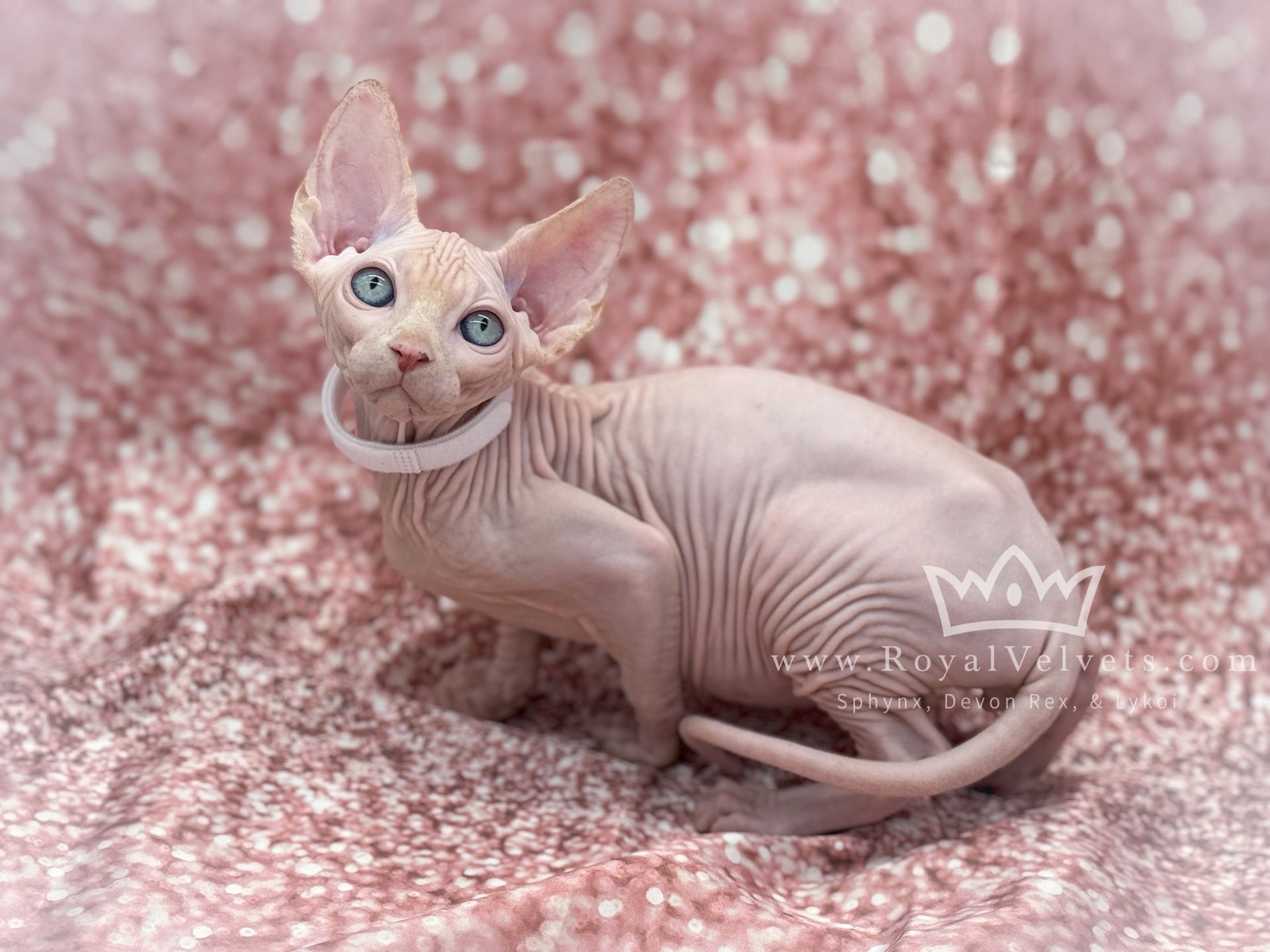
February 5, 2024
Nestled in the scenic embrace of Spring City, TN, our cattery stands as a beacon of hope for allergy sufferers in Nashville, TN and surrounding areas yearning for the companionship of a feline friend. With the majestic mountains as our backdrop, we're not just about breeding cats; we're about creating bonds that thrive in harmony with your lifestyle and health needs. Today, we're diving deep into the heart of cat allergies, unraveling the mysteries of hypoallergenic breeds, and guiding you toward making an informed choice that brings joy, not sneezes, into your life. Understanding the Whiskers and Whys of Cat Allergies Before we leap into the world of hypoallergenic cats, let's tackle the basics. What's the deal with cat allergies? It turns out, the culprits are proteins like Fel d 1, lurking in cat dander, saliva, and even urine. These tiny, invisible-to-the-eye particles can send your immune system into overdrive, leading to those all-too-familiar allergy symptoms. The Hypoallergenic Heroes of Our Cattery Among the lush landscapes of Nashville, our cattery is home to some of the most enchanting hypoallergenic breeds. Let's meet the stars of the show 1. The Sphynx: A Bare Necessity The Sphynx , with its captivating hairless appearance and warm, peach-like skin, is often the poster child for hypoallergenic cats. But it's not just their lack of a fur coat that makes them special; it's their reduced production of allergenic proteins. These affectionate "naked" wonders love to cuddle, making them the perfect warm blanket on a chilly Nashville night. 2. The Devon Rex: A Curly Companion Don't let the soft, wavy locks of the Devon Rex fool you; they're as hypoallergenic as they come. Their coats are not only low-shed but also require minimal grooming, reducing the spread of allergens. Plus, their elfin faces and large, expressive eyes will charm their way into your heart, making every day a magical one. 3. The Lykoi: The Allergen-Friendly Werewolf The Lykoi , with its unique roan coat and intriguing "werewolf" looks, stands out not just for its appearance but also for its hypoallergenic qualities. These cats shed less and produce fewer allergens, making them a fascinating choice for those looking to add a touch of the mystical to their lives. Living in Harmony: Tips for Allergy-Free Coexistence Embracing a hypoallergenic cat is a step in the right direction, but harmonious living doesn't stop there. Here are some pro tips to keep your sneezes at bay Embrace the Bath : Regular baths can help reduce the allergens on your cat's skin. Just make sure it's a spa experience for both of you! Keep It Clean : A clean home is your best defense. Air purifiers, frequent vacuuming, and keeping your feline friend's favorite spots clean can make a world of difference. Zone Defense : Establish cat-free zones, like the bedroom, to give your immune system a break. FAQs Unfurled Can someone with severe allergies live with a hypoallergenic cat? While hypoallergenic cats can be a better fit for allergy sufferers, individual reactions vary. Spending time with a breed before adopting can help gauge your compatibility. Will a hypoallergenic cat completely eliminate my allergies? While they significantly reduce allergens, it's not a total cure. But with the right management, your symptoms can be greatly minimized. How often should I groom my hypoallergenic cat? It varies by breed, but aiming for a bath every 4-6 weeks and weekly brushings should keep allergens in check. Can I test my allergy response to different breeds? Absolutely! Spending time with various breeds can be eye-opening. For a more scientific approach, consult with an allergist. Are there any special considerations for hypoallergenic cats? Beyond regular veterinary care, hypoallergenic cats may benefit from a diet that supports skin health and reduces shedding. Can children with allergies safely interact with hypoallergenic cats? Yes, but it's important to introduce them slowly and monitor for any allergic reactions. How can I reduce cat allergens in my home? In addition to selecting a hypoallergenic breed, use air purifiers, vacuum regularly, and establish pet-free zones to minimize allergens. Do hypoallergenic cats require special food? While there's no specific hypoallergenic diet for cats, high-quality, balanced nutrition can support overall health and reduce shedding. A Purr-fect Match Awaits Choosing the right cat for your allergy needs doesn't have to be a compromise between your health and the joy of cat ownership. With our guide and the unique breeds available at our Spring City, TN cattery, you're well on your way to finding a hypoallergenic companion that suits your lifestyle and brings endless joy and sneeze-free cuddles. So, why wait? Join our waitlist and let the journey to your purr-fect match begin today! Have questions? Reach out to us !
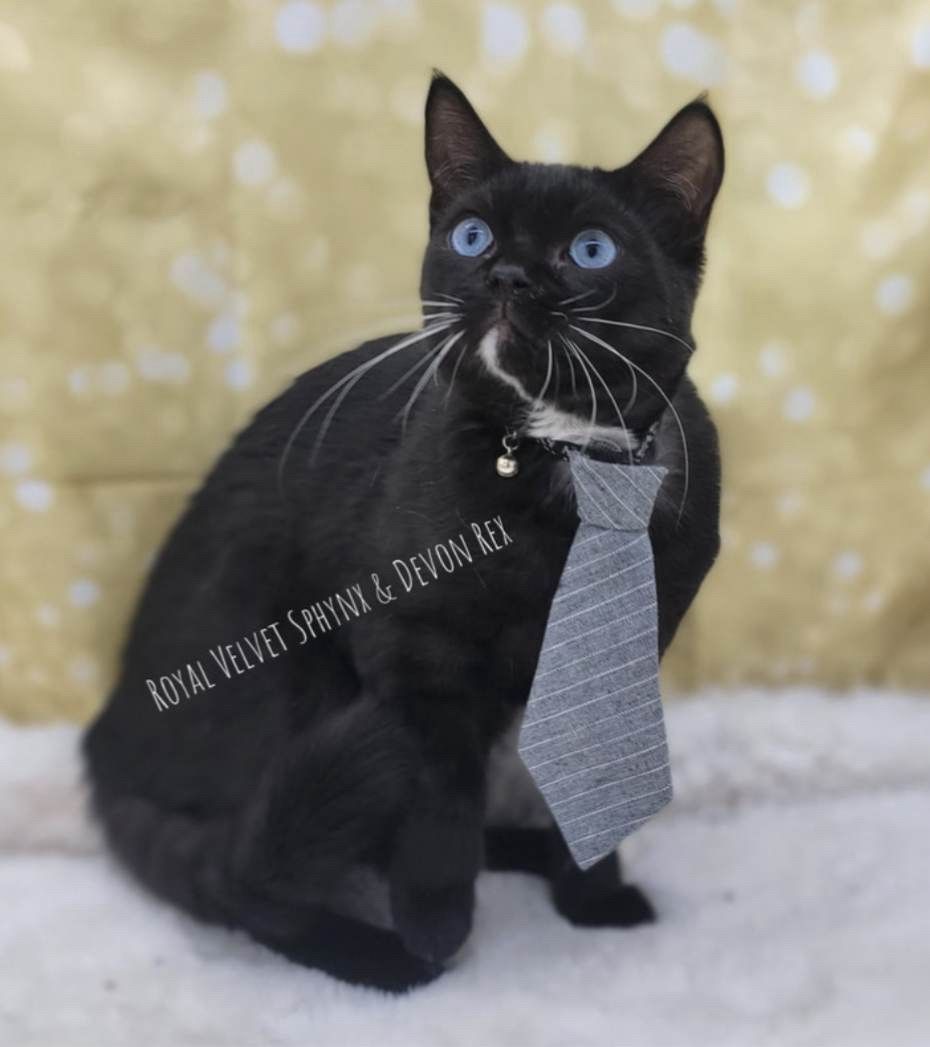
January 15, 2024
The world of cat breeding is vast and intricate, with diverse techniques to ensure the well-being and beauty of our feline companions. One such method, known as outcross breeding, stands out not only for its ability to enhance the gene pool but also for the unique kittens it produces. At Royal Velvets , we've embraced this practice, occasionally offering enthusiasts the rare opportunity to own a "coated Sphynx". This article delves into the benefits and peculiarities of outcross kittens, especially our very own coated Sphynx , which offers a blend of iconic Sphynx aesthetics and a hint of furry charm. Understanding Outcross Breeding Outcross breeding is a practice where two cats of different breeds or lines are mated to produce offspring. This method is distinct from line breeding or inbreeding, where related cats are mated to emphasize specific traits. The primary goal of outcrossing is to introduce genetic diversity, which can significantly reduce the risk of inherited diseases and strengthen the overall health of the breed. The broader gene pool resulting from outcrossing often leads to kittens with robust immune systems and fewer genetic complications. In addition, these kittens can showcase unique physical characteristics, making them stand out in the feline world. "Coated Sphynx" - A Unique Variant The coated Sphynx is a result of outcross breeding and brings a twist to what many envision when thinking of a Sphynx cat. Instead of the signature hairless appearance, the coated Sphynx possesses a fine coat of fur. This coat is not as dense as other breeds but is soft to the touch, providing a unique tactile experience for cat owners. These cats inherit the playful, affectionate, and curious nature of a typical Sphynx, making them excellent companions. What's more, the coat can come in various patterns and colors, adding to the uniqueness of each individual kitten. Owning a coated Sphynx is an opportunity to cherish the traditional Sphynx personality while enjoying the novelty of its appearance. It's a blend of the familiar and the unexpected, perfect for those who value both tradition and novelty. Benefits of Outcross Breeding Outcross breeding, though not as familiar to the general public, carries a host of advantages that benefit both the cats and their future owners: Genetic Diversity : The primary reason breeders engage in outcrossing is to increase the genetic diversity within the breed. This diversity often results in healthier cats with a lower risk of inherited diseases. Strengthening the Breed : By introducing new genes into the mix, breeders can reinforce certain desirable traits, be it related to appearance or health. This practice ensures the longevity and resilience of the breed. Unique Combinations : Outcrossing can lead to the birth of kittens with unexpected and unique appearances. The range of colors, patterns, and coat types expands, offering potential cat owners a wider variety to choose from. Cost-Effective : As mentioned, outcross kittens, particularly the coated Sphynx variant, often come at a more affordable price point. This provides an accessible route for individuals who wish to own a Sphynx cat without the typical price tag. Maintaining Temperament : One of the greatest joys of owning a Sphynx is their affectionate and playful temperament. Outcross breeding ensures that these beloved traits are preserved, even if the appearance changes. The journey of outcross breeding in the world of Sphynx cats is an exciting and beneficial venture, aiming to ensure the future health and vitality of the breed. While traditional Sphynx cats have always been a favorite among feline enthusiasts for their unique appearance and personality, outcross kittens offer a fresh perspective and an alternative for those seeking something different. Their distinct appearance combined with the cherished traits of the Sphynx make them a joy to own. Opting for a coated Sphynx through outcross breeding not only allows potential cat owners to benefit from a lower price point but also contributes to the broader initiative of diversifying the Sphynx gene pool for healthier future generations. If you're intrigued by the possibility of owning one of these unique kittens, don't hesitate to explore the opportunity with Royal Velvets and get yourself added to the waiting list today .
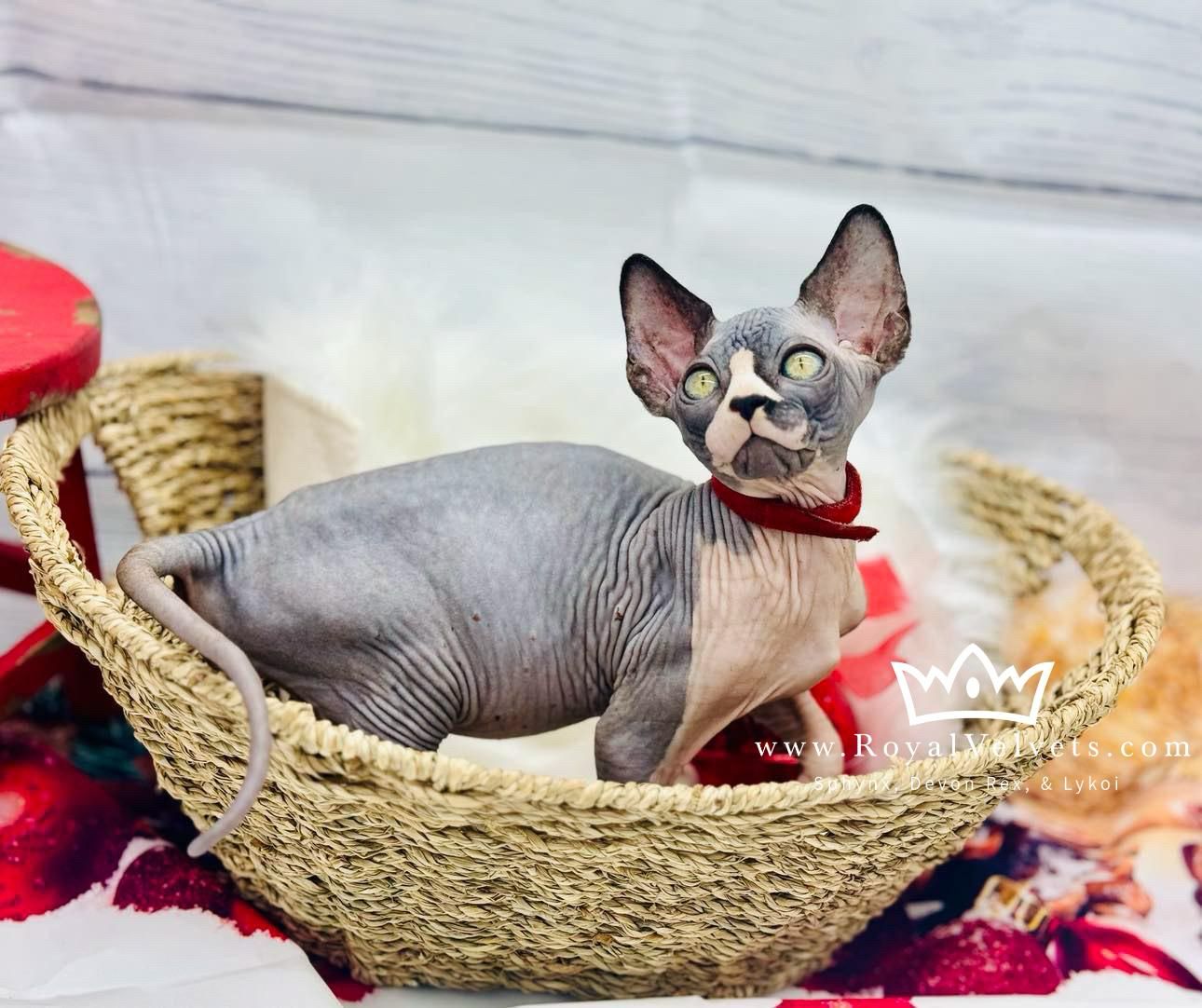
December 16, 2023
In the diverse realm of feline companionship, few breeds captivate as deeply as the Sphynx , Lykoi , and Devon Rex . Each one, a testament to nature's quirks, offers prospective pet owners a unique blend of history, aesthetics, and temperament. However, as with any living being, understanding their nuances is vital before welcoming them into one's home. The allure of these breeds often lies in their striking appearances and endearing personalities. Yet, there's more than meets the eye. This guide seeks to unravel the mystique surrounding these three cat breeds, providing a well-rounded perspective for those considering one of these delightful felines as their next pet. Whether you're drawn to the near-mystical allure of the Sphynx, the intriguing werewolf-esque features of the Lykoi, or the playful charm of the Devon Rex, a journey of discovery awaits. Interested in meeting one of these breeds? Browse our available kittens here . The Enigmatic Sphynx A silhouette devoid of the typical furry splendor associated with cats, the Sphynx stands out, not just for its absence of a coat, but for its striking features and undeniable charisma. Often mistaken as truly hairless, the Sphynx's skin is akin to soft suede, sometimes dotted with light fuzz, offering a warmth that's delightful to touch. Origin and History : The Sphynx's journey began in Toronto, Canada, in 1966 when the first hairless kitten, named Prune, was born. This naturally occurring genetic mutation prompted intrigue and the desire to cultivate this unique breed. With careful breeding, the modern Sphynx was born, blending both its unique aesthetics and charming personality. Physical Attributes : Beyond its hairlessness, the Sphynx is recognized by its muscular physique, large ears that stand like sentinels, and a whip-like tail. Their skin, which comes in a plethora of patterns and colors, often carries wrinkles, particularly around the shoulders, between the ears, and around their expressive, almond-shaped eyes. Personality : A creature of warmth, both literally and metaphorically, the Sphynx is an outgoing cat, known for its energy and affection. Contrary to its somewhat alien appearance, this breed craves human connection, often following its owner around and seeking out laps for warmth and companionship. Ideal Living Conditions and Care Considerations : Their lack of a protective coat means the Sphynx requires a different care regimen. Regular baths are essential to remove the oils that accumulate on their skin, and sun protection is a must to prevent sunburn. Their love for warmth might often lead them to bask near windows or snuggle under blankets. Fascinated by the Sphynx? Learn more about adopting one from our cattery . Lykoi – The Werewolf Among Cats If legends of werewolves intrigue you, the Lykoi cat might be the closest feline equivalent. With its unique coat pattern and captivating eyes, the Lykoi exudes an air of mystery and charm. Origin : The name 'Lykoi' finds its roots in the Greek word for wolves. This breed emerged from a natural mutation in domestic shorthair cats, first documented in 2010 in the USA. While they may seem otherworldly, their genetics are very much terrestrial, with no Sphynx genes despite some similarities in appearance. Physical Appearance : The Lykoi's signature look arises from a gene that affects hair growth, leaving them with a partially hairless coat that resembles the mythical werewolf. Their fur is patchy, often dense around the face but sparse on the body. This gives them a rugged, wild appearance, complemented by their large, luminous eyes. Personality : Don't let the wild exterior fool you; the Lykoi is a bundle of affection. They're known for their loyalty and playful nature. Intelligent and with a hint of hunting instinct, Lykois are observant and often form deep bonds with their human companions. Care Considerations : Despite their rough appearance, Lykois don't require excessive grooming. An occasional brush and bath will suffice. Their skin, however, can be sensitive, making it crucial to ensure they're protected from harsh weather conditions, especially intense sunlight. Ready to welcome a Lykoi into your home? See our adoption process . Devon Rex – The Pixie Cat With a mischievous glint in its eyes and a coat that defies conventions, the Devon Rex is often referred to as the pixie or alien of the feline world. Its playful demeanor and unique appearance make it a beloved breed among cat enthusiasts. Physical Attributes : The Devon Rex's most notable feature is its curly coat, soft to touch and often compared to waves or ripples. This is paired with large, bat-like ears and a slender physique, giving them their characteristic 'elfish' look. Their eyes, wide and inquisitive, only add to their enchanting presence. Personality : One could call the Devon Rex the jester of the feline kingdom. Highly playful, energetic, and social, these cats are known to engage in antics that keep their owners entertained. Their loyalty is unparalleled, and it's not rare to find a Devon Rex perched on a shoulder, playing fetch, or even joining you in bed. Special Care Considerations : The Devon's short, wavy coat sheds less than other breeds but requires occasional grooming to maintain its texture. Being indoor cats, they love warmth and might seek out cozy spots around the house. Their diet should be monitored, as they're known for their voracious appetite and can be prone to obesity. Thinking of adopting a Devon Rex? Explore our Devon Rex kittens available for adoption . Comparative Analysis In the feline world, the Sphynx, Lykoi, and Devon Rex stand out not only for their captivating appearances but also for their distinctive personalities and care needs. Let's unravel the similarities and differences among these three breeds Appearance Sphynx : Near hairless with a suede-like feel to the skin. Lykoi : Partially hairless, presenting a wild, werewolf-like look. Devon Rex : Soft, wavy, and short coat, paired with large ears, giving them a pixie appearance. Origins Sphynx : Originated from a natural mutation in Toronto, Canada, in 1966. Lykoi : A more recent breed, emerged from a natural mutation in the USA around 2010. Devon Rex : Discovered in the UK during the 1950s, they share no relation to the Cornish Rex despite similarities. Personality Traits Sphynx : Outgoing, warm, and extremely affectionate. Lykoi : Loyal, observant, and forms deep bonds with humans. Devon Rex : Playful jester of the feline world, loyal and social. Care Considerations Sphynx : Requires regular baths, sun protection, and seeks warmth. Lykoi : Low maintenance but needs protection from harsh weather. Devon Rex : Occasional grooming and a monitored diet. Each of these breeds offers a unique experience, and the choice often boils down to an individual's preferences, living conditions, and the kind of feline companionship they seek. Need guidance choosing the right breed for your home? Contact our team for personalized advice or view our frequently asked questions . Conclusion The tapestry of the feline kingdom is rich and varied, with breeds like the Sphynx, Lykoi, and Devon Rex offering a mesmerizing blend of history, appearance, and temperament. While their aesthetics might be the initial draw, it's their unique personalities and care considerations that truly set them apart. For prospective cat owners, understanding these nuances is paramount. Whether you're drawn by the warmth of the Sphynx, the wild charm of the Lykoi, or the playful antics of the Devon Rex, it's essential to recognize that each breed offers a distinct companionship experience. Armed with this knowledge, one can embark on a fulfilling journey with their feline friend, ensuring a relationship marked by understanding, care, and mutual affection. In the end, the joy of pet ownership is not just in the breed but in the bond forged over shared moments, laughter, and the simple pleasure of a purring companion by your side. Ready to embark on the feline journey? Reach out to us today and let's find your perfect match!
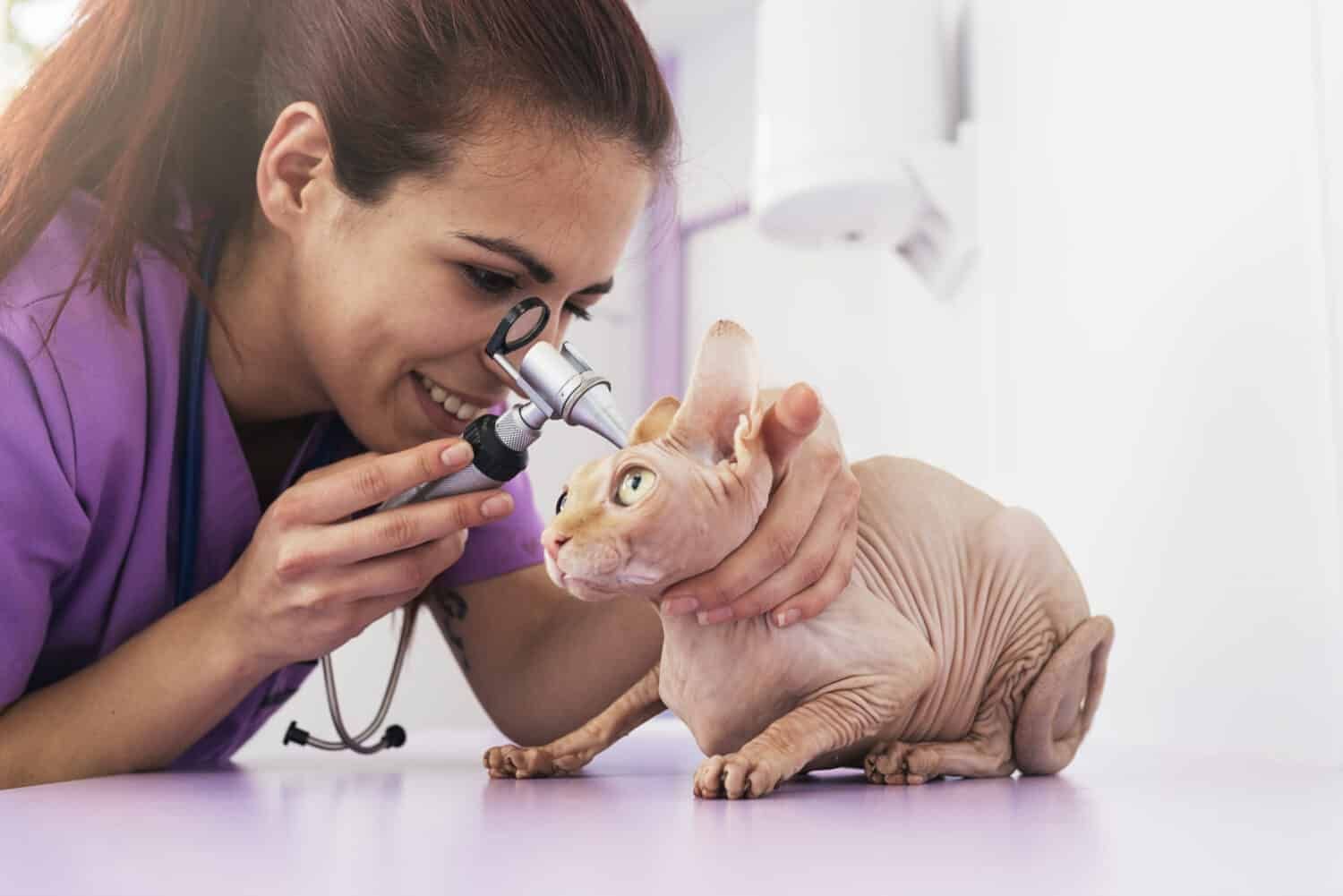
November 15, 2023
For the passionate cat enthusiast, understanding the unique health nuances of different breeds is paramount. Hypertrophic Cardiomyopathy, or HCM, is a term that might ring familiar to many who delve into the feline world, especially when considering breeds like the Sphynx , Lykoi , and Devon Rex . As a potential or current cat owner, knowledge of this condition can not only help in early detection but also in providing the best care to your feline friend. In this comprehensive guide, we'll shed light on HCM, its implications for the aforementioned breeds, and the proactive steps to ensure a cat's healthy and fulfilling life. What is HCM? Hypertrophic Cardiomyopathy (HCM) stands as the most common heart disease in cats. It's characterized by the thickening of the heart muscle, particularly the ventricular walls, without any apparent cause. This thickening can hinder the heart's ability to pump blood efficiently, potentially leading to other complications like congestive heart failure. Although the exact causes of HCM in cats remain a topic of ongoing research, certain genetic factors and predispositions have been identified, especially in particular breeds. Given its silent nature, many cats with HCM might show no obvious symptoms until the disease has progressed significantly, underscoring the importance of early detection and regular health screenings. HCM in Sphynx, Lykoi, and Devon Rex When it comes to heart health in felines, not all breeds share the same risks. Though any breed of cat can develop HCM - Sphynx, especially, has a noted predisposition to HCM. While it's essential to approach this with caution, it's equally crucial to have an informed perspective. Sphynx : This breed, celebrated for its hairless beauty and affectionate nature, has a well documented history with HCM. Research suggests that a significant percentage of Sphynx cats can develop this condition, with genetics playing a pivotal role. Diet and environment can also play a role in the development of HCM. Currently there is only one genetic marker that has been discovered for HCM in sphynx. And is thought to be responsible for up to 60% of the documented cases of HCM. It is believed that there is one additional genetic marker that is responsible for the remaining 40% but has not yet been discovered. There is still a lot of research that needs to be done, in regards to the HCM gene(s). But should still be used as a tool in breeding. That is why it is still so crucial that proper screening is done yearly. Lykoi : Often referred to as the "werewolf cat" due to its unique appearance, the Lykoi's relationship with HCM is still under study. However, initial findings highlight a potential genetic linkage to the disease, making it a point of attention for breeders and owners alike. Yearly screening is recommended. Devon Rex : With its large eyes and elf-like ears, the Devon Rex is a breed many fall in love with. But like the Sphynx, there's a known correlation with HCM. While not as pronounced as in the Sphynx, Devon Rex owners should remain vigilant about regular heart screenings too. It's essential to note that while these breeds might have a predisposition, it doesn't guarantee the onset of HCM in every individual cat. Responsible breeding practices, health screenings, and early detection remain the best defense against this heart ailment. Signs and Symptoms Awareness is the first line of defense against many health conditions, and this is especially true for HCM. Recognizing early warning signs can be the difference between timely intervention and irreversible complications. Here are some symptoms cat owners should keep an eye out for: Difficulty Breathing : Cats with HCM might exhibit labored breathing or breathe rapidly, even when at rest. Lethargy : A noticeable decrease in activity levels or a reluctance to play can be indicators. Faint or Collapse : In advanced cases, the cat might faint or collapse due to decreased oxygen circulation. Loss of Appetite : A sudden disinterest in food or weight loss might suggest a possible heart issue. Heart Murmurs : While not always a definitive sign of HCM, heart murmurs detected during vet check-ups could be indicative of the condition. It's crucial to understand that these symptoms can also be associated with other health issues. Hence, regular veterinary check-ups, including heart screenings, play an indispensable role in early detection and accurate diagnosis. Treatment and Management When faced with an HCM diagnosis, many cat owners might feel overwhelmed. However, with appropriate care and management, many cats diagnosed with HCM can still lead long, comfortable lives. Here's how: Medication : There are several drugs available that help manage HCM symptoms. Beta blockers and calcium channel blockers, for instance, can help relax the heart muscle and reduce the heart's workload. Dietary Changes : A low-sodium diet can assist in reducing fluid buildup in cats with HCM. The absence of taurine in the diet is known to cause heart disease in cats. Always consult with your veterinarian about the best dietary choices for your feline. Regular Check-ups : Regular veterinary visits are imperative. They allow for the early detection of potential complications and adjustments to treatment plans as needed. Stress Reduction : Minimizing stress is vital. A calm, stable environment can reduce the strain on a cat's heart. Consider creating a serene sanctuary or using feline pheromone diffusers to promote relaxation. Stay Informed : As research on HCM progresses, new treatments and insights might emerge. Stay updated and maintain open communication with your vet. Remember, while an HCM diagnosis might seem daunting, with the right approach and dedicated care, your beloved feline can continue to thrive. And if you're ever in doubt, seeking a second opinion or consulting with a veterinary cardiologist can offer further clarity and peace of mind. New research and treatment for HCM: HCM Treatment Conclusion Hypertrophic Cardiomyopathy (HCM) might sound intimidating, especially when associated with cherished breeds like the Sphynx, Lykoi, and Devon Rex. However, with awareness, regular screenings, and informed care, managing HCM becomes less daunting. While some breeds have a predisposition to HCM, it's vital to remember that each cat is unique. Not every individual will develop this heart condition, but being equipped with knowledge ensures that you're prepared should the need arise. Until the other genetic markers are discovered - we may never eradicate HCM completely from our cats. The best tool we have is to track our pedigrees/lines and to screen all of our cats yearly for HCM. To include cats that are no longer in our breeding program & pet siblings of our breeding clan. We encourage all of our adopters to do the same as it is important for us to track our lines for health. If you're considering welcoming one of these stunning breeds into your home, or if you're already a proud cat parent, prioritize their heart health. Regular vet visits, early detection, and a loving environment can make all the difference. If you're searching for a kitten with a strong lineage and thorough health screenings, consider Royal Velvets Cattery . Our commitment to feline health and well-being stands unparalleled.
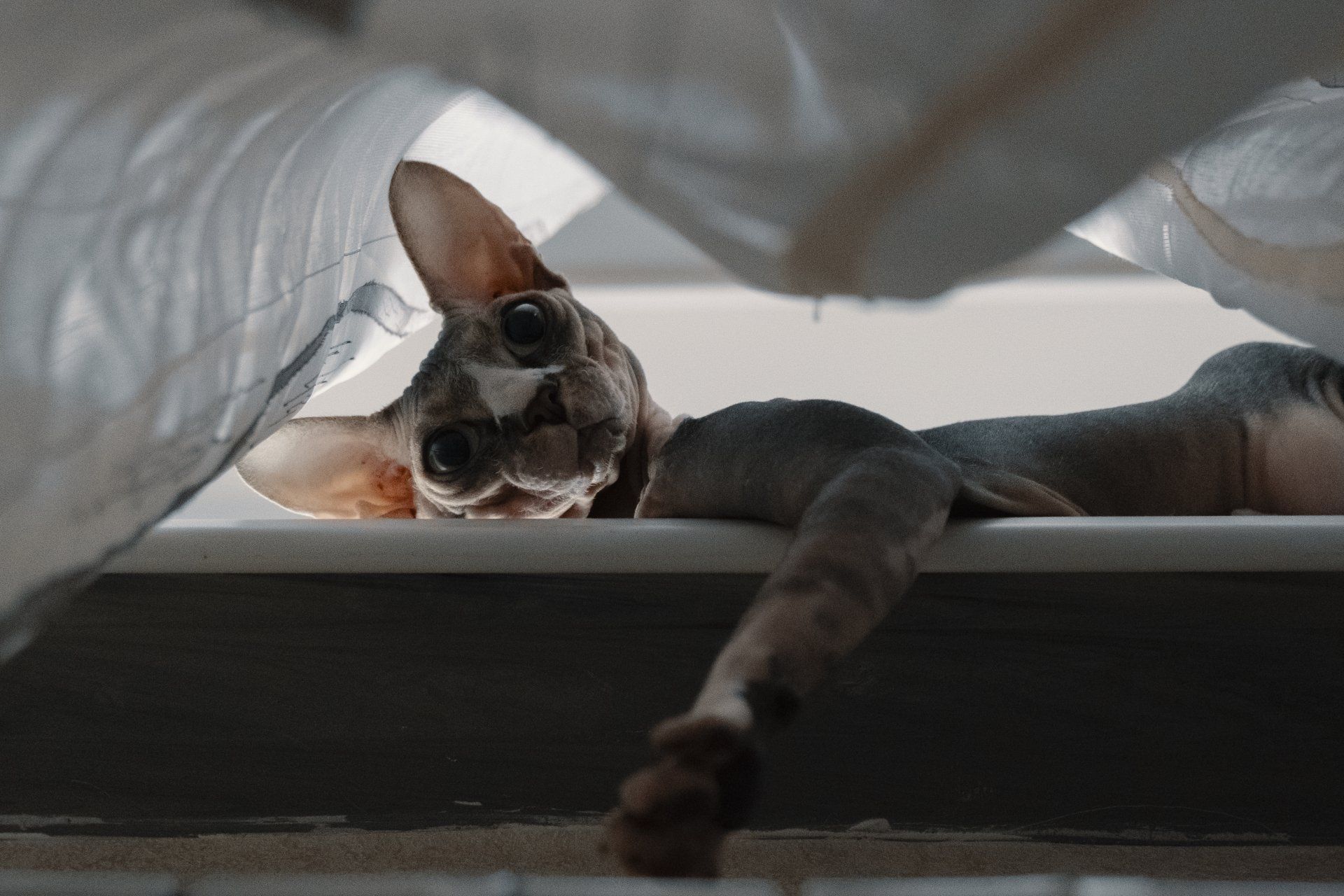
October 7, 2023
Sphynx cats , with their arresting appearance and charming personalities, have become a phenomenon in the feline world. While you might recognize them for their distinct lack of fur, there's so much more to these cats than meets the eye. Dive into these intriguing facts that set the Sphynx apart. 1. A History Unlike Any Other The Sphynx's story begins not in the vast deserts of Egypt, as many assume, but in the colder climates of Toronto, Canada. Back in 1966, a domestic cat gave birth to a hairless kitten due to a natural genetic mutation. This event marked the genesis of the Sphynx breed. Over the years, careful breeding has helped to enhance and solidify the distinct traits of the Sphynx. While they are a relatively new breed, they have quickly gained immense popularity, captivating the hearts of cat enthusiasts around the world. Their history reminds us of the unexpected twists and turns of genetics and the ever-evolving world of feline breeding. 2. Sphynx Cats Aren’t Actually Hairless Despite the popular belief, Sphynx cats aren't completely bald. They're covered in a fine layer of fuzz, making their skin feel like suede or peach fuzz. This downy fur provides a minuscule amount of insulation. It's this unique skin texture that makes many describe the experience of touching a Sphynx as similar to feeling warm suede or perhaps even a heated chamois cloth. Moreover, due to the lack of a thick fur coat, their body warmth is easily felt, making snuggles with them especially cozy during colder months. Yet, this feature requires potential owners to be mindful, as these cats may seek warmth more actively and prefer cozier spots around the house. 3. Warm to the Touch One of the first things people notice when they touch a Sphynx cat is their warmth. Unlike other cats covered in a layer of fur, the Sphynx's exposed skin absorbs and radiates heat more directly, making them feel warmer to the touch. This sensation can be quite pronounced, especially in cooler environments. While their body temperature is comparable to other felines, the lack of fur makes the warmth more apparent to our senses. However, this also means Sphynx cats can lose heat more rapidly. Their love for cozy spots is a natural behavior to maintain body warmth. They are often found seeking out the sunniest spots in the house, nestling into blankets, or even cuddling up to other pets and humans. This innate tendency to seek warmth not only keeps them comfortable but also deepens the bond they share with their human companions, who they see as a source of warmth and affection. 4. The Lounging Lovers For those who haven't been graced with the company of a Sphynx, it might come as a surprise to learn that they are incredibly affectionate, often described as "dog-like" in their need for attention and companionship. Their friendly demeanor and warmth-seeking tendencies make them perfect snuggle companions. Due to their lack of a fur coat, Sphynx cats naturally gravitate towards warmth. This means they absolutely adore cuddling, whether it's under the covers, on a sunlit windowsill, or nestled on a warm human lap. When they aren't soaking up the sun or seeking warmth, you'll find them playing or lounging around with their family members, be it human, feline, or even canine. It's also worth noting that their social nature extends beyond the confines of home. Many Sphynx owners recount tales of their feline friends warmly greeting guests, eagerly partaking in family activities, or simply enjoying being the center of attention. Their curious and sociable nature combined with their distinct appearance often makes them the star of any gathering. 5. Natural Climbers with Muscular Bodies Don't be fooled by their slender looks; the Sphynx is a bundle of muscles. Their agility and strength make them excellent climbers, and they're always on the prowl for a high vantage point. At first glance, the Sphynx's lean and muscular physique stands out. It's not just for show; these cats possess an agility that often catches many off guard. With a strikingly athletic build, they are natural climbers and love to explore vertical spaces. Don't be surprised to find them perched on the highest shelf or gracefully navigating a cat tree. Their lack of fur allows their toned musculature to be clearly visible, giving them a statuesque appearance. This defined musculature isn't just about aesthetics. It provides the strength they need for their acrobatic endeavors, from darting around the house in playful bursts of energy to mastering challenging jumps with ease. Another fascinating attribute is their strong and dexterous paws. These are used not only for climbing but also for holding toys, picking up small objects, or even opening doors. Their coordinated movements and inquisitive nature make interactive toys and climbing apparatuses a great choice for stimulating both their body and mind. Given their active and playful nature, it's a good idea to have dedicated play sessions to keep your Sphynx engaged and maintain their physical fitness. They thrive in environments where they can channel their energy constructively and bond with their families during playtime. 6. Maintenance Can Be Misunderstood While it's a common misconception that the hairless Sphynx requires little to no grooming, the reality is quite different. Without the protective layer of fur, their skin produces oils that aren't absorbed by hair, leading to a buildup that can cause skin problems if not regularly cleaned. Bi-Weekly to monthly baths are recommended for these feline beauties to prevent oil buildup and keep their skin healthy. When bathing a Sphynx, it's essential to use a gentle, cat-specific shampoo and ensure they are dried thoroughly afterward, paying special attention to the creases in their skin. Moreover, their ears also produce more wax since there aren't any hairs to prevent the accumulation of dirt and debris. Regular ear cleaning, using a vet-approved solution, will keep infections at bay and ensure your Sphynx's ears remain in tip-top shape. Their nails and the skin between their toes can also get oily and require regular cleaning. Care should be taken to ensure no moisture remains between their toes, as this can lead to fungal infections. Despite their grooming needs, many Sphynx owners find the bonding time during these maintenance routines to be quite special. It provides an opportunity for closeness, building trust, and ensuring your cat feels pampered and loved. 7. Expressive and Eager Ears The Sphynx's distinctive large ears aren't just a standout feature in terms of appearance; they play a pivotal role in their communication and expression. Spanning an impressive width and standing upright, these ears can rotate, twitch, and move in response to a variety of stimuli. These feline friends use their ears to signal their mood and intentions. For example, when a Sphynx is curious or alert, their ears will be perked up, standing tall and forward. However, if they are feeling threatened or annoyed, the ears might rotate to the side or flatten backward. The size of the Sphynx's ears also enhances their hearing abilities. They can pick up on even the faintest sounds, whether it's the rustling of a treat bag or the distant chirping of birds outside. This acute sense of hearing combined with their inquisitive nature often makes them quick to respond to any intriguing sound around the home. Additionally, the absence of hair in their ears means there's nothing to dampen or muffle sounds, potentially making their hearing even sharper. However, this also means that owners should be diligent about cleaning their ears, as mentioned earlier, to prevent any buildup or potential infections. Whether they're using their ears to express curiosity, contentment, or caution, the Sphynx's expressive ears are a testament to their communicative and attentive nature. 8. Their Skin Tells a Story The skin of a Sphynx is a canvas that exhibits a myriad of colors, patterns, and textures, resembling those of their furred counterparts. Just because they lack a full coat doesn't mean they lack the defining patterns and markings that make each cat unique! When you stroke the skin of a Sphynx, you might notice a variety of tactile sensations, from the velvety softness of their sparse fuzz to the occasional wrinkle or fold. Their skin feels warm and smooth, akin to human skin, but with its own feline signature. One fascinating aspect of the Sphynx breed is that their skin color often mirrors what their fur might have looked like. This means that if a Sphynx were to have a coat, it could be tabby, calico, tortoiseshell, or any other traditional feline pattern. Hence, you might come across a Sphynx with faint stripes, spots, or patches that allude to these patterns. The patterns and colors on their skin can be a topic of intrigue and admiration. It's like a treasure hunt, deciphering the beautiful markings and imagining the tales they might tell if they could speak. The wrinkles, especially around the forehead and shoulders, add another layer of charm and character to these enigmatic felines. 9. They're Quite the Chatterboxes Sphynx cats are notorious for their vibrant personalities and vocal tendencies. If you're looking for a quiet, demure feline friend, the Sphynx might surprise you with its diverse range of sounds! These cats have no qualms about expressing their thoughts, wants, and needs. From soft, melodious purrs when they're content, to a series of chirps and trills when they're playful or curious, a Sphynx cat ensures you're always tuned in. It's not unusual for them to engage in 'conversations' with their humans, responding with a series of clicks, meows, and even the occasional yowl. Their vocal repertoire is vast, and they're never shy about using it. This communicative nature is just another testament to their sociable and interactive personalities. Their sounds can be a source of endless entertainment and bonding. Whether they're alerting you to an empty food bowl, commenting on the birds outside, or just wanting to chat about their day, their vocalizations are an integral part of their charm. 10. Not Always Sunbathers While the sleek and nearly naked appearance of the Sphynx cat might suggest they're natural sun worshippers, the reality is a little more nuanced. Due to their lack of protective fur, Sphynx cats are more susceptible to the elements than their furry counterparts. The sun's rays can be both a blessing and a curse for these unique felines. On one hand, they love to bask in the warm sunlight, soaking up its comforting warmth, especially given their higher body temperature. The sun can be a great source of pleasure for them, and many Sphynx owners can attest to their pets seeking out sunny spots around the house for a quick sunbath. However, their hairless skin is more vulnerable to sunburn. Prolonged exposure without protection can result in a painful sunburn, and repeated sunburns can lead to more severe skin conditions or complications. Therefore, it's essential for owners to monitor their Sphynx's sunbathing habits closely. Some owners even apply cat-safe sunscreen or dress their Sphynx in light clothing to protect them from the sun's harmful rays. In contrast, their lack of fur means they can get cold quickly, so it's not uncommon to find them snuggling under blankets, seeking out warm spots, or even cuddling up with their humans for some shared warmth. Conclusion The Sphynx cat, with its almost otherworldly appearance and captivating personality, has earned its place in the hearts of many. Their unique characteristics, from their suede-like skin to their chatty nature, make them a delightful and intriguing companion. Each trait we've discussed paints a vivid picture of a breed that, while lacking in fur, is overflowing with charm and charisma. Beyond their physical attributes, it's their undying affection, intelligence, and playful demeanor that truly set them apart. While they might require a bit more care in terms of maintenance and protection from the elements, the reward of having a Sphynx in your life is immeasurable. For those considering welcoming a Sphynx into their home, understanding and appreciating their unique qualities will only deepen the bond you share. And for those who are simply admirers from afar, it's easy to see why the Sphynx continues to capture attention and admiration worldwide. Fascinated by the world of Sphynx cats? Explore deeper insights into this breed and others by navigating to our detailed breed articles. If the Sphynx's allure has captured your heart, join our waiting list at Royal Velvets for a feline companion unlike any other.

October 7, 2023
Owning a cat, especially breeds as unique and captivating as the Sphynx , Lykoi , and Devon Rex , comes with its joys and challenges. One such challenge is understanding the health risks these felines might face. Like all cats, these breeds can be susceptible to certain viral infections. Being aware of these potential threats is crucial not only for the well-being of the cat but also for the peace-of-mind of the owner. With their distinct appearances and personalities, the Sphynx, Lykoi, and Devon Rex have garnered much love worldwide. However, with this love comes the responsibility of ensuring their health and longevity. This article dives deep into some of the common viruses these breeds might encounter and offers insights into handling and preventing these infections. As we proceed, remember that informed care and timely interventions can make all the difference in ensuring a healthy and happy life for these wonderful companions. Since kittens are not born with natural specific (adaptive) immunity - it’s critical that they remain with their mothers to receive a temporary immunity - by way of colostrum - produced in the first few days of mothers milk. It is thought that this temporary immunity starts to decline around week 5. That’s why it is very important to start vaccinating against these diseases starting around week 8. Vaccine schedules may vary, depending on the manufacturer and veterinary advice. But purchasing a kitten from a reputable breeder and working closely with your vet will ensure the best protection. Vaccines work by stimulating the immunity to develop specific immunity. Though, like most human vaccines - they are also not 100% protection against some of these viruses. It does, however, lessen the severity of disease while also providing enough protection to help fight off these foreign invaders. Here at Royal - we work very closely with our vet clinic and our kittens have all age appropriate vaccines prior to leaving for their new homes. Feline Leukemia Virus (FeLV) Feline Leukemia Virus, commonly known as FeLV, is one of the most widely recognized and potentially deadly viruses in cats. It's a retrovirus, which means it can insert copies of its own genetic material into the cells it infects. Over time, this can lead to a multitude of health problems, ranging from cancer to various blood disorders. How does FeLV affect Sphynx, Lykoi, and Devon Rex breeds? While FeLV can infect cats of any breed, age, or gender, the way it manifests might differ. The unique genetic makeup of Sphynx, Lykoi, and Devon Rex might influence their susceptibility or response to the virus. However, it's essential to remember that environment, age, and overall health often play a more significant role than breed alone. Symptoms FeLV is a bit of a shape-shifter when it comes to symptoms. Some cats might show signs such as lethargy, weight loss, poor coat condition, and fever, while others may seem perfectly healthy. Other possible symptoms include respiratory issues, digestive problems, or even reproductive complications. Prevention and Treatment The best defense against FeLV is prevention. Though the FeLV vaccine is not a core vaccine, and typically only recommended for outdoor cats, it is still a good idea to discuss the pros and cons of the vaccine with your vet and then decide what's best for your particular cat and situation. Regular vet check-ups and screenings can also help catch the virus early, improving the prognosis. If a cat is diagnosed with FeLV, treatment will focus on managing symptoms, preventing secondary infections, and enhancing their quality of life. Considering the implications of FeLV, it's crucial for potential and current cat owners, especially those enamored by the Sphynx, Lykoi, or Devon Rex breeds, to be well-informed. Remember, early detection, prevention, and care are vital. Interested in adopting a feline friend who has been thoroughly screened for such health concerns? Explore our kittens , at Royal Velvets health and happiness go hand in hand. Feline Herpes Feline Herpes, scientifically known as Feline Herpesvirus 1 (FHV-1), is one of the prevalent viral infections that can affect cats including the charming breeds of Sphynx, Lykoi, and Devon Rex. The virus chiefly targets the respiratory system, but its symptoms can manifest in multiple ways, sometimes making it a bit tricky to diagnose. It is said that 99% of all cats have or have had Feline Herpesvirus 1 at some point in their life. Kittens seem to be at most risk. So that's why it is so important to continue vaccine protocols all through their life - as suggested by your vet. And to try to keep your kitten as relaxed and stress free as possible. How does Feline Herpes affect Sphynx, Lykoi, and Devon Rex breeds? The unique physical attributes of Sphynx, Lykoi, and Devon Rex breeds don’t particularly predispose them to Feline Herpes, but like other cats, they are susceptible. The virus can cause respiratory distress and other discomforts that can affect their quality of life. The local climate of Nashville, TN, may also play a role in the transmission and impact of the virus. Symptoms The symptoms of Feline Herpes include but are not limited to: Sneezing and nasal discharge Conjunctivitis (inflammation of the eye) and discharge from the eyes • Corneal ulcers Fever Depression or lethargy Loss of appetite Recognizing these symptoms early can pave the way for a timely intervention, alleviating the discomfort faced by your beloved feline companion. Prevention and Treatment Preventing Feline Herpes chiefly revolves around minimizing exposure to infected cats & continuing their vaccine regime. However, in a multi-cat environment or a cattery, managing exposure can be challenging. Here are some steps you can consider: Vaccination : Consult with your vet about the Feline Herpes vaccine to provide your cat with immunity against the virus. Hygiene : Maintain a clean and hygienic environment to reduce the risk of virus transmission. Stress Management : Stress can trigger a herpes outbreak; hence, keeping your cat’s environment calm and comfortable is essential. Lysine Supplements : Consult with your vet about Lysine supplements which may help in managing the symptoms of Feline Herpes. Treatment, on the other hand, focuses on alleviating the symptoms, as there's no cure for Feline Herpes. Antiviral medications, eye drops, and antibiotics to control secondary bacterial infections can be part of the treatment plan. Your vet may also recommend supportive care like fluid therapy if your cat is severely affected. Caring for a Sphynx, Lykoi, or Devon Rex cat is a rewarding experience, and understanding the health challenges they might face is part of the journey. If you need guidance on managing or preventing Feline Herpes in your feline companion, we're here to help. Reach out to us for expert advice, and let’s ensure your cat enjoys a healthy and vibrant life. Explore our world where the health and happiness of our feline companions are our top priority. Feline Immunodeficiency Virus (FIV) Often referred to as the 'Feline AIDS' due to its similarities with the human HIV, Feline Immunodeficiency Virus (FIV) is another significant viral infection that cat owners should be aware of. The virus attacks the cat's immune system, making it challenging for the feline to fight off other infections. This virus is usually only a concern for outdoor cats or indoor/outdoor cats, but it's important to still be aware of the risks. Sphynx, Lykoi, & Devon Rex are strictly indoor cats and should not be allowed outside to free roam. How does FIV manifest in Sphynx, Lykoi, and Devon Rex cats? All cat breeds, including our stars, the Sphynx, Lykoi, and Devon Rex, are susceptible to FIV. It's typically transmitted through bite wounds, which means that male outdoor cats often have a higher risk due to territorial disputes. It's essential to be vigilant and take preventive measures, regardless of the breed. Symptoms The initial signs of FIV are often subtle and might go unnoticed. Over time, a cat infected with FIV may develop chronic dental problems, recurrent skin, urinary, or respiratory infections due to their weakened immune system. Progressive weight loss and a deteriorating coat condition are also indicators. Measures to Prevent and Manage One of the most effective measures against FIV is neutering, especially if your cat is male and has outdoor tendencies. This will reduce the likelihood of fights and bite wounds. There's also a vaccine available, though it's not without controversy, so discuss with your vet the best preventive measures. For cats diagnosed with FIV, keeping them indoors, regular vet check-ups, and a balanced diet are crucial to ensure a healthy life. Note: All of our kittens are placed already spayed and neutered. A well-informed owner can provide a loving and caring environment for their feline friend, ensuring they lead a happy life regardless of the challenges they might face. Looking for a new feline family member? At Royal Velvets, our cats are nurtured with love, and their health is our top priority. Explore the joy of adopting a cat that's been given the best start in life. Feline Infectious Peritonitis (FIP) Feline Infectious Peritonitis, or FIP, is caused by a mutation of a feline coronavirus. While most strains of this coronavirus are relatively harmless, some mutations can lead to the deadly disease known as FIP. It's a complex disease that has been a challenge for veterinarians to understand fully. It is thought that 99% of all cats have or have been exposed to FIP at some point in their life. How is FIP relevant for Sphynx, Lykoi, and Devon Rex cats? No specific breed, including the Sphynx, Lykoi, or Devon Rex, has been found to be more susceptible to FIP than others. However, it's worth noting that cats in densely populated environments, like catteries or shelters, might be at a slightly increased risk. Symptoms FIP can manifest in two forms: wet (effusive) and dry (non-effusive). The wet form is characterized by fluid accumulation in the abdomen or chest, leading to breathing difficulties or a bloated appearance. The dry form can be more elusive, with symptoms ranging from weight loss, depression, anemia, and fever, to inflammation of various body tissues. Prevention and Management The primary prevention method for FIP is ensuring a clean environment for your cat, especially if you're bringing a new kitten into your home. Regular vet check-ups can also play a pivotal role in early detection. While historically FIP was considered fatal, recent advancements in treatments show promise, making early detection even more crucial. Though not yet available for use legally in the United States, the GS-441524 trial drug has made promising results in treating and curing FIP. Ensuring that your feline companion is well-taken care of, regularly checked, and living in a clean environment can reduce the risks associated with such viruses. At Royal Velvets, we prioritize the well-being of our cats, ensuring they are raised in pristine conditions and undergo regular health checks. Join our family of satisfied and happy cat parents by exploring our available kittens. Feline Panleukopenia (FPV) Also known as Feline Distemper, Feline Panleukopenia Virus (FPV) is a highly contagious and deadly disease, especially in kittens. It targets rapidly dividing cells in a cat's body, particularly in the bone marrow and intestines. How does FPV affect Sphynx, Lykoi, and Devon Rex breeds? FPV is an indiscriminate virus, impacting cats of all breeds, including our special Sphynx, Lykoi, and Devon Rex. The virus is resilient and can survive in the environment for years, making vaccination an essential preventative measure for all cats, regardless of breed or living conditions. Symptoms Symptoms can be rapid and severe, including high fever, lethargy, sudden weight loss, vomiting, and severe diarrhea. As it progresses, it can lead to dehydration and anemia. In kittens, the virus can even impact the development of the cerebellum, causing neurological symptoms. Prevention and Treatment Vaccination remains the gold standard for prevention. Regular cleaning and disinfection of living areas can also help reduce the risk. If diagnosed early, supportive care, including hydration and antibiotics to prevent secondary bacterial infections, can help increase survival rates. Knowledge is power. By being informed and taking the necessary preventive steps, you can protect your precious feline from such threatening diseases. At Royal Velvets, every kitten is vaccinated and given a thorough health check to ensure they get the best start in life. Dive into our world of healthy and joyful kittens awaiting their forever homes. Wrapping Up Every cat owner knows that a feline friend is more than just a pet – they're family. The Sphynx, Lykoi, and Devon Rex breeds, with their unique appearances and personalities, have captured the hearts of many. As a responsible cat parent, understanding common viral threats can make a world of difference in ensuring a long, healthy life for your feline companion. While these viruses might seem daunting, the right knowledge and proactive steps can prevent most of them. From regular vet check-ups, vaccinations, and maintaining a clean environment, to understanding the symptoms and early detection, you can shield your cat from potential health concerns. As you embark on this journey of feline companionship, remember to always prioritize their health and well-being. In doing so, the bond you share with your furry friend will only grow stronger, filled with countless purrs and cuddles. Ready to welcome a new feline into your life? At Royal Velvets, we've got your back. From health checks to guidance on cat care, you're not just adopting a kitten – you're joining a community that cherishes every purr and whisker twitch.
